Special Report
The Most Republican County in Each State

Published:
Last Updated:

In just over a month, the United States will finally elect its next president after close to two years of campaigning, fundraising, scandals, and debates.
Republican candidate Donald Trump is considered an outsider to politics and the party. As a result — and because Trump’s views have sometimes clashed with the party’s vision — some have wondered whether this election might be less divided along party lines than in recent elections. Despite the division within the Republican Party, most major polls suggest that the majority of states will vote the same as in the past several elections. It seems that a portion of the population will always vote Republican or Democrat no matter who is running for president.
Based on voting data compiled by political news organization Politico and a review of current and historical representation in the U.S. Congress, 24/7 Wall St. created an index to measure the political leanings of U.S. counties’ residents. The index is based on the political party of the county’s elected representatives to the Senate and House of Representatives through the last five election cycles, as well as the results of the 2012 presidential election.
Click here to see the most Republican county in every state.
Click here to see the most Democratic county in every state.
Even in the most liberal states there is at least one county that has strong Republican leanings. In Illinois, 57% of the electorate voted for President Barack Obama, the state’s former senator. Yet, in Wayne County, less than 20% of those who went to the polls voted for Obama. Wayne, which is in the state’s 15th congressional district, has been represented by a Republican for decades.
The racial composition of these counties can likely help explain the Republican leanings of the area’s residents. The vast majority of residents in most of the reddest counties identify as white. In 40 states, at least 80% of the population of the most Republican county identify as white. That was the case in just 12 of the bluest counties in each state.
Voters in the reddest counties were almost always more likely than residents of other counties to vote Republican during the 2012 presidential election, and the share of votes cast for then Republican candidate Mitt Romney was almost always greater than 50%. However, in four of the reddest counties — Honolulu County, Hawaii; Plymouth County, Massachusetts; Washington County, Rhode Island; and Essex County, Vermont — a majority of residents voted to reelect Obama in 2012. In these counties, Romney still captured the largest share of votes compared to other counties in the state.
Click here to read our methodology.
These are the most Republican counties in every state.

1. Alabama
> Reddest county: Blount County
Blount County is the reddest county in Alabama. In 2012, more than 86% of voters cast their vote for Romney, the highest share of any county in Alabama. In addition, county residents are represented in the House by the 4th and 6th Congressional Districts, both of which are held by Republicans. As with other predominantly Republican-leaning counties, Blount County residents are also poorly educated, with only 12.3% of adults attaining at least a bachelor’s degree, a smaller share than the 29.3% of American adults with such a degree.
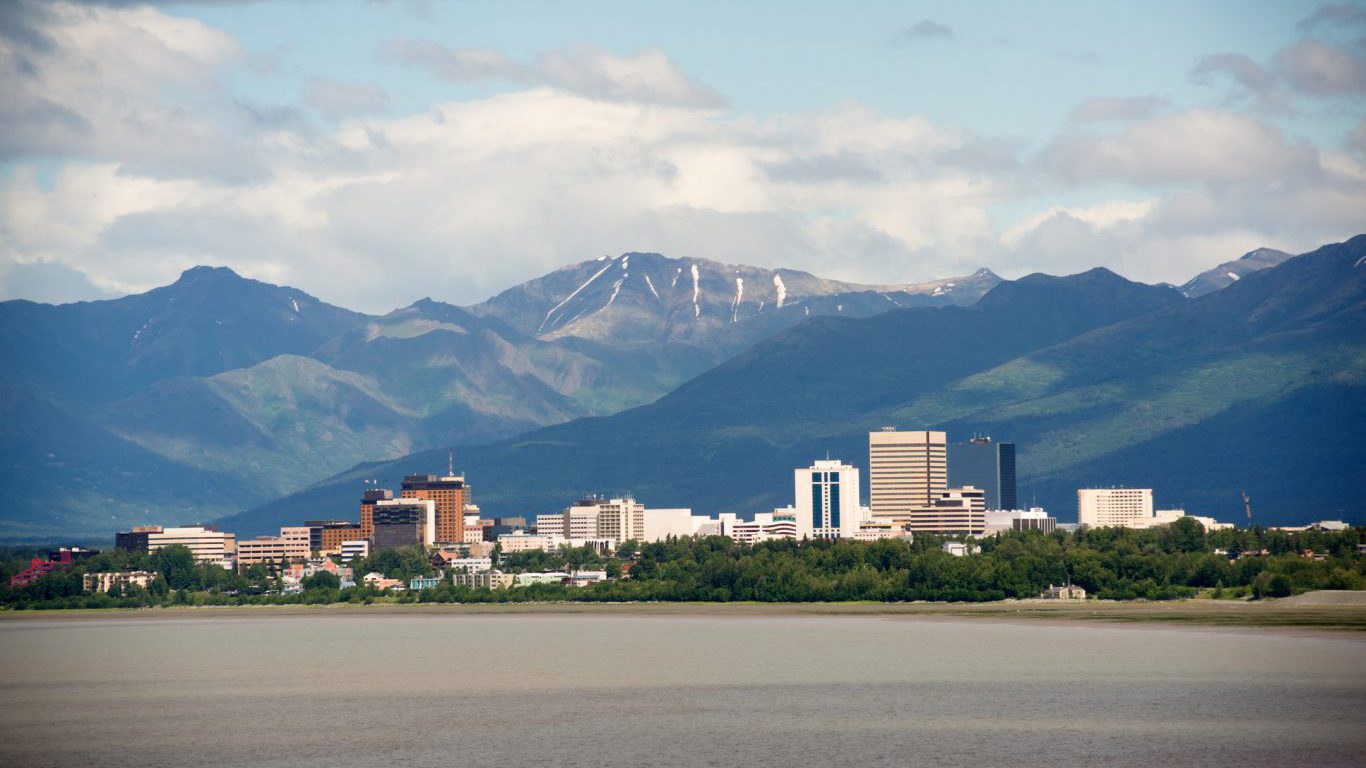
2. Alaska
> Reddest county: N/A
Data for Alaska counties is not sufficient to identify the most or least Democratic area in the state. However, Alaska residents as a whole trend conservative. A majority of eligible residents in the state voted for Romney in 2012, and all three members of Alaska’s congressional delegation are Republican.
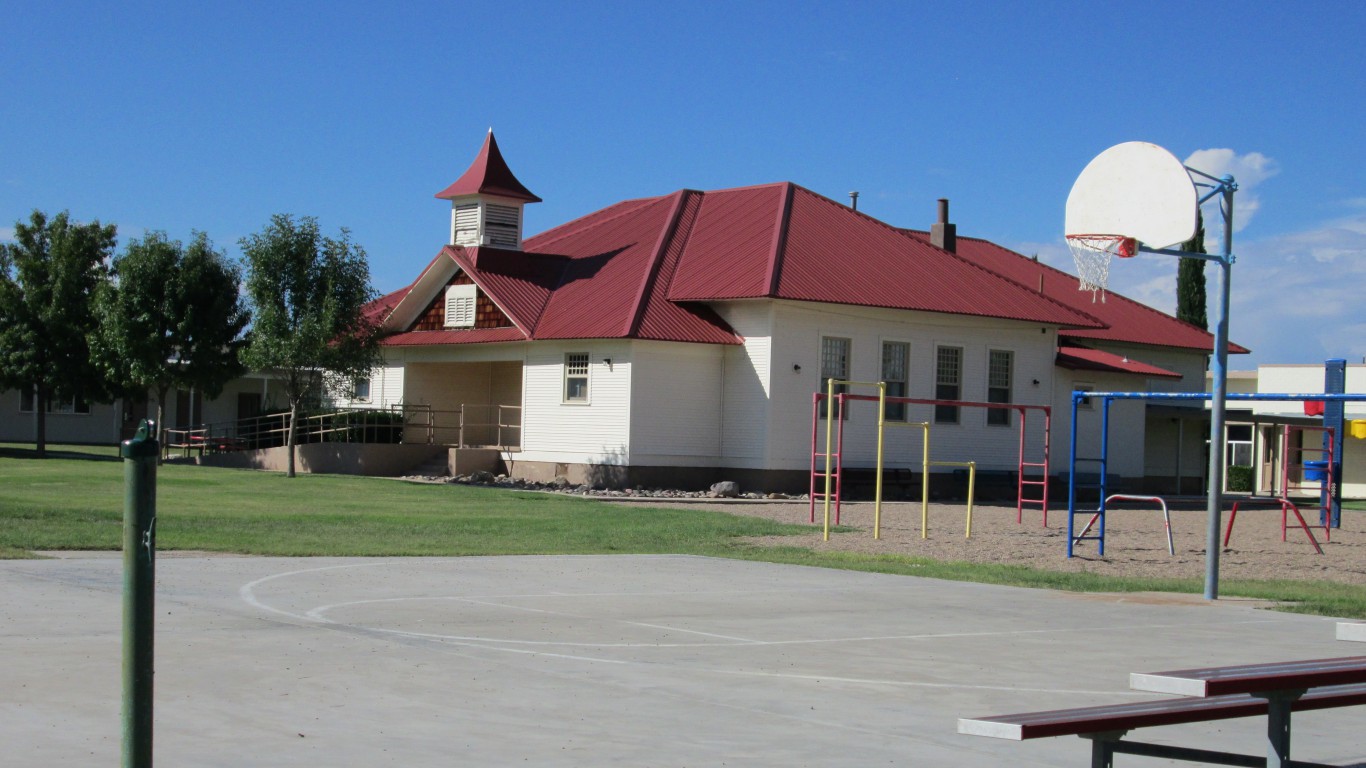
3. Arizona
> Reddest county: Cochise County
Romney won 60.7% of the 2012 votes cast in Cochise County, the sixth highest share of any county in Arizona. While voters in a number of other counties in the state cast higher shares of votes for Romney than Cochise county, those counties have not enjoyed the same level of Republican representation in Congress. The state’s 2nd District, which includes Cochise County, has been represented by a Republican in four of the last five congressional sessions. Both of Arizona’s senators have also been Republicans over that time.
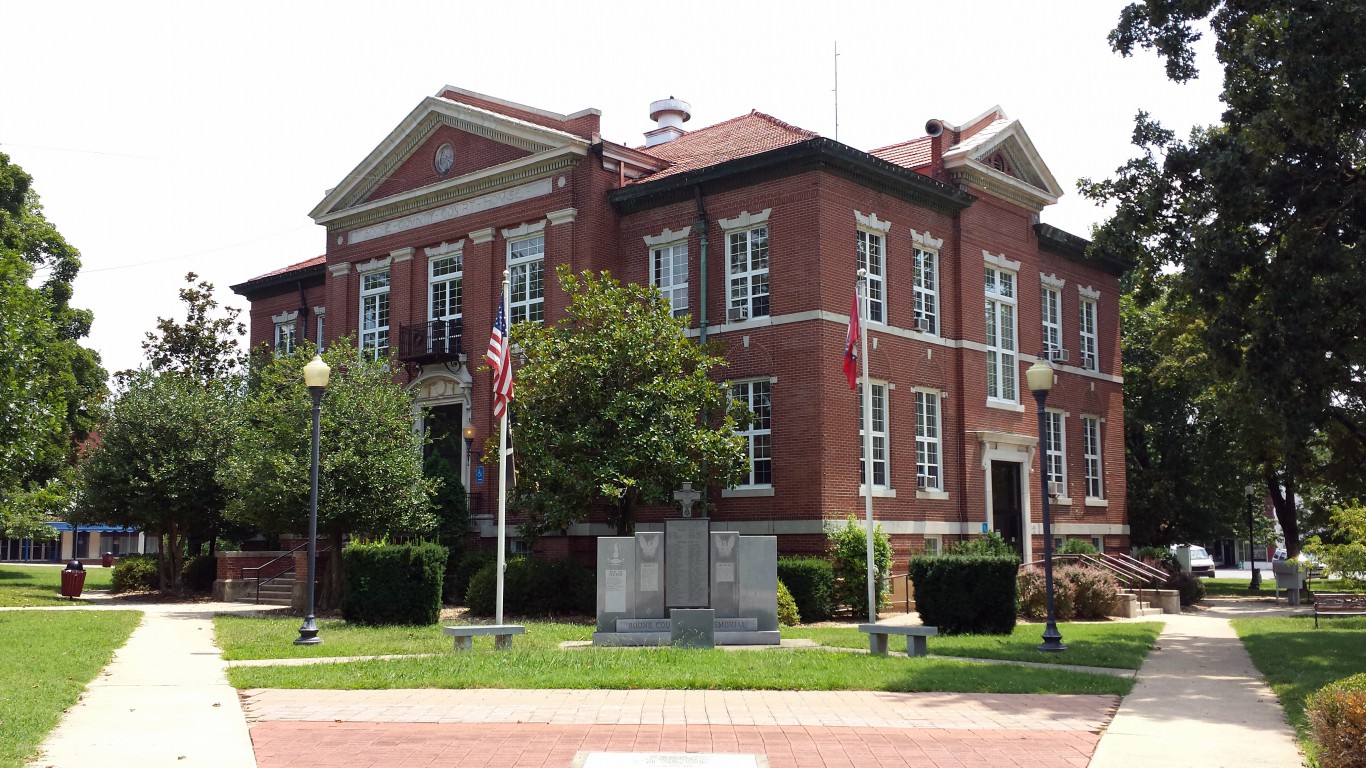
4. Arkansas
> Reddest county: Boone County
Romney won 72.5% of the 2012 votes cast in Boone County, contributing to its rank as the reddest county in Arkansas. Adults in Republican-leaning counties tend to have lower educational attainment rates than residents of blue counties. Boone County is no exception. Just 15.1% of adults have at least a bachelor’s degree, nearly half the share of American adults with such a degree.
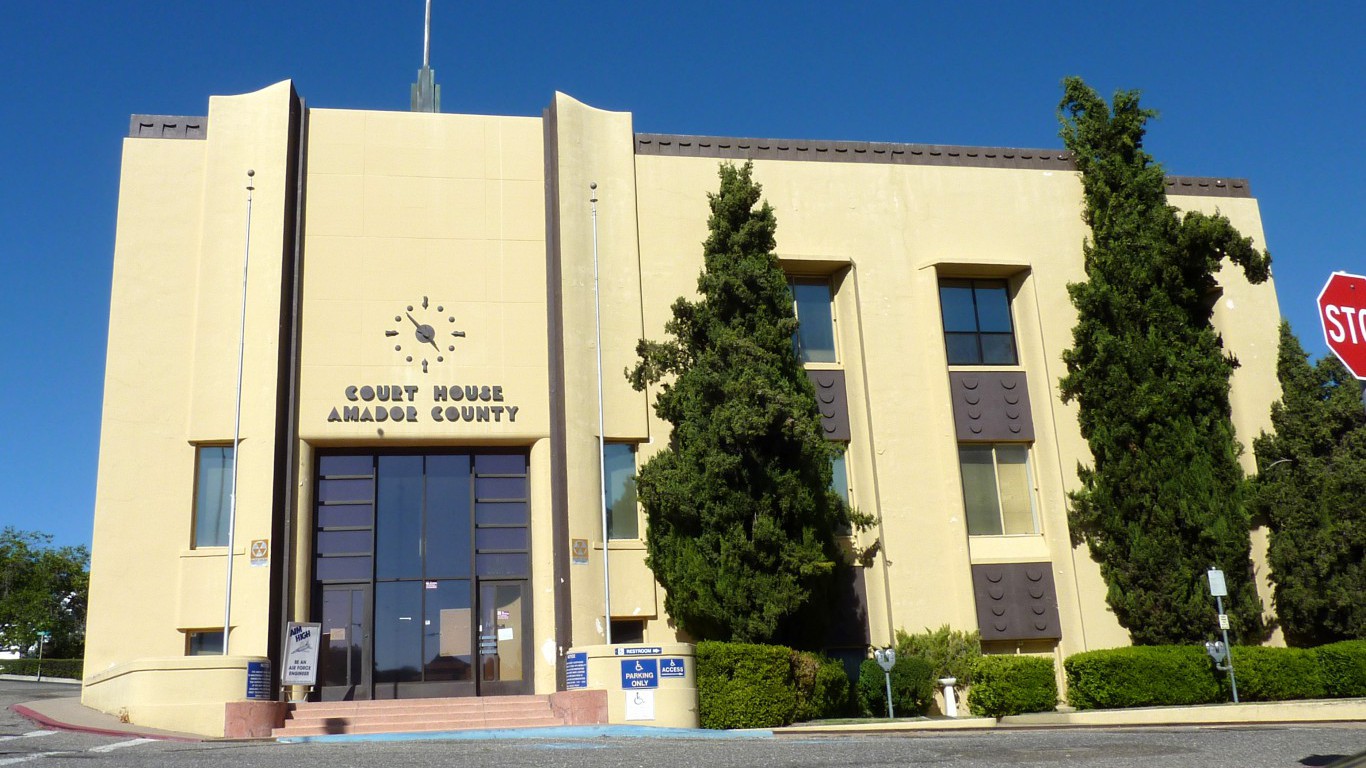
5. California
> Reddest county: Amador County
Amador County is a Republican stronghold in a predominantly blue state. While nearly 60% of California voters cast their ballot for Obama, only 40% of voters in Amador County voted for the president. The county is represented by Rep. Tom McClintock of the 4th District, one of just 14 Republicans representing the state’s 53 congressional districts. Both senators — Dianne Feinstein and Barbara Boxer — are longstanding Democrats.
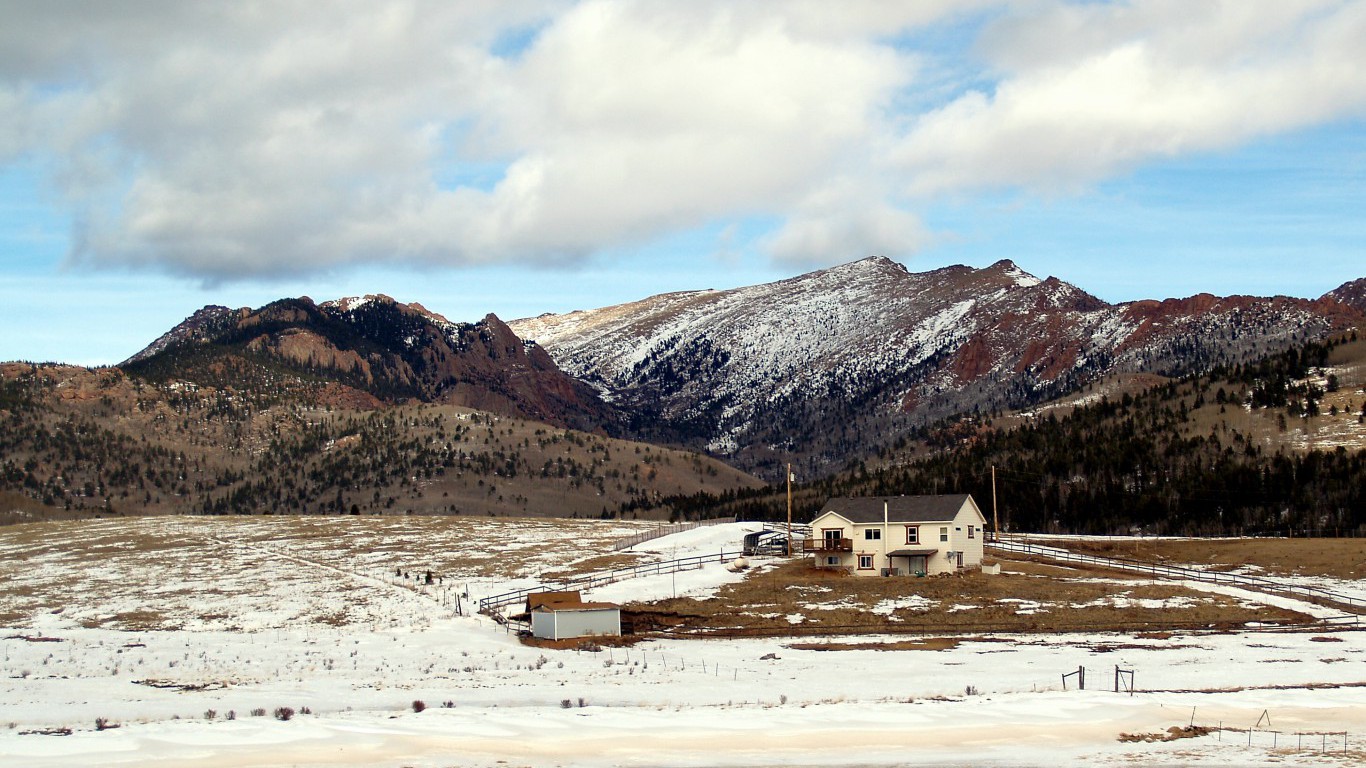
6. Colorado
> Reddest county: Teller County
Though all of Colorado’s nine electoral votes went to Obama in 2012, some parts of the state are solidly Republican. Slightly more than 65% of voters in Teller County preferred Romney over Obama in the 2012 presidential election. With Democrat Michael F. Bennet and Republican Cory Gardner, Colorado’s representation in the Senate is split between the two major parties.
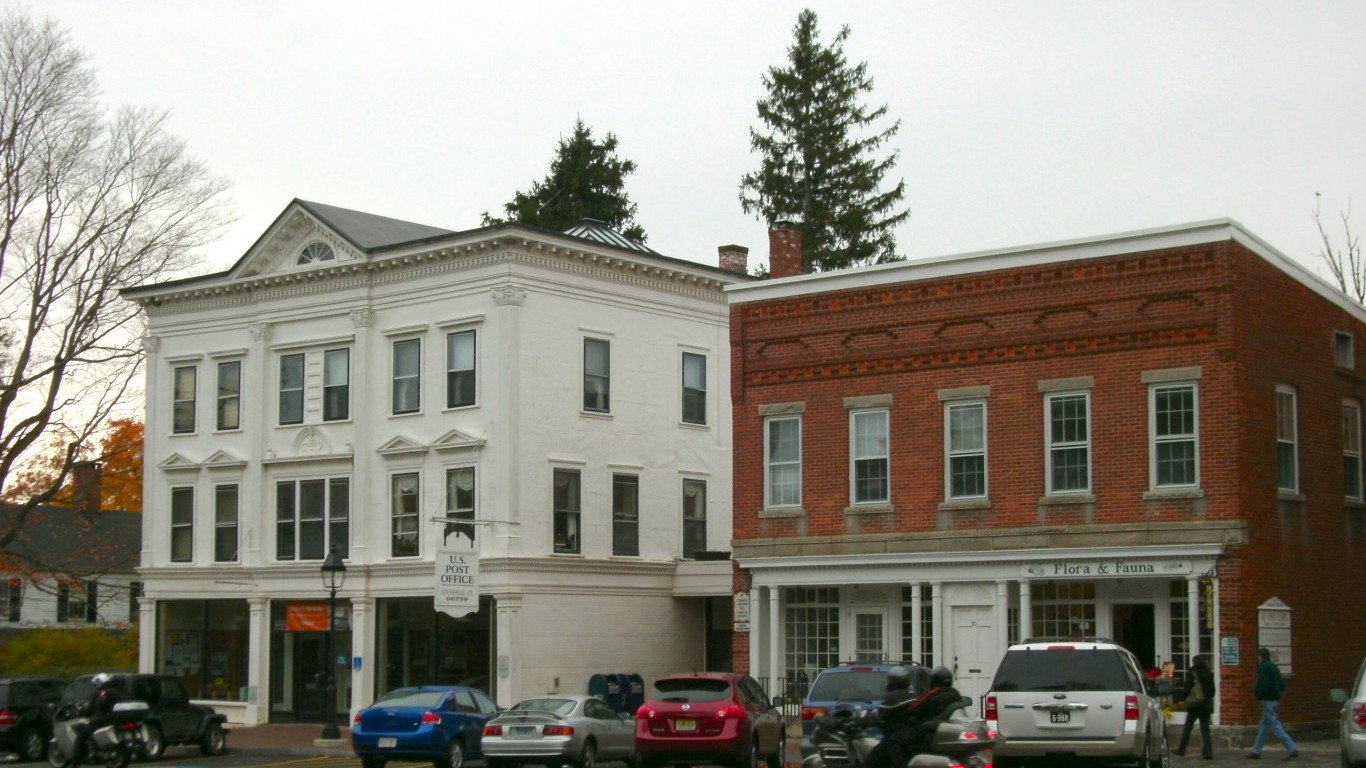
7. Connecticut
> Reddest county: Litchfield County
Litchfield is the reddest county in a traditionally blue state. A larger share of Litchfield County residents voted for Romney than in any other county in Connecticut. Despite majority support for the Republican nominee, Litchfield has not been as supportive of the Republican Party on the congressional level. In each of the last five congressional elections, county voters favored a Democrat. As in many counties across the country where a majority of voters supported Romney, Litchfield residents are more likely to be financially stable. Median household income across the county is $72,068, considerably higher than the the national median income of $53,428.
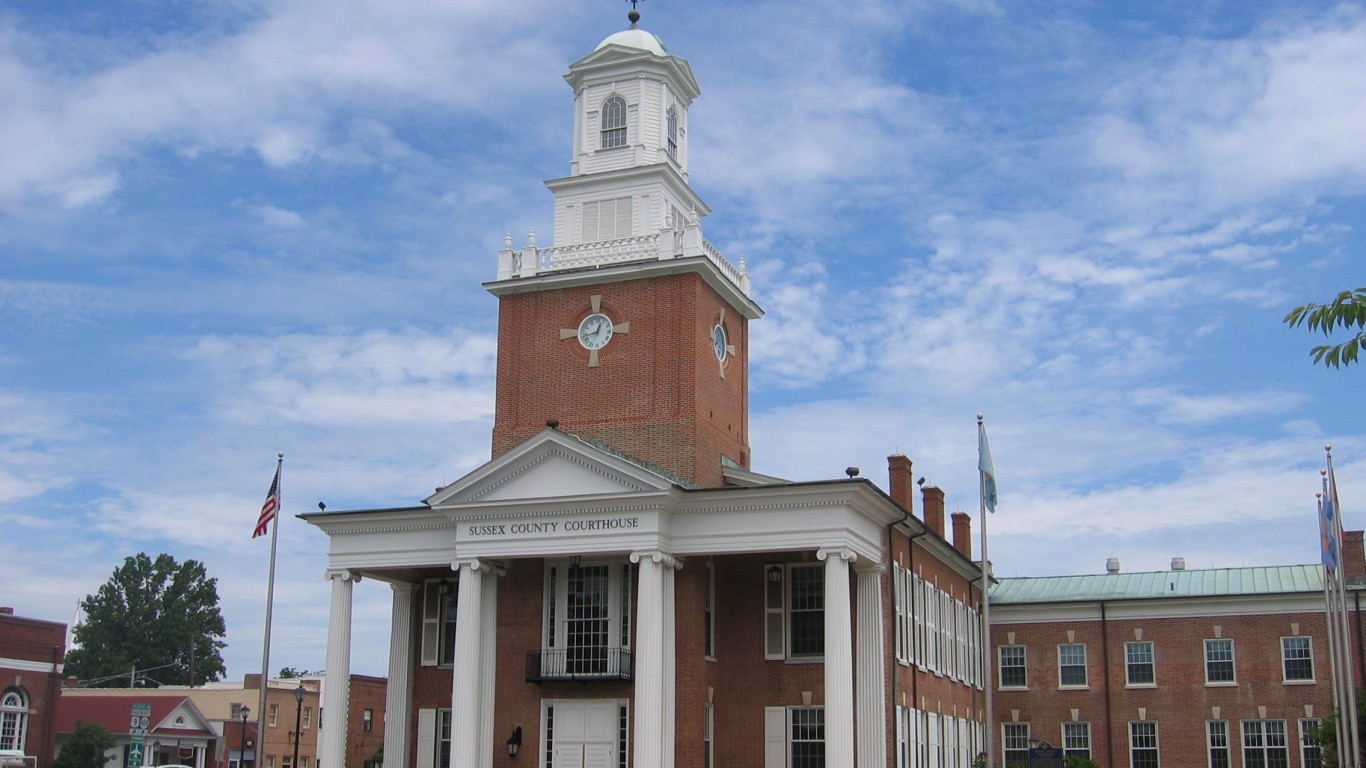
8. Delaware
> Reddest county: Sussex County
While over half of Sussex County voters preferred Romney in the 2012 presidential election, the highest share of any county in Delaware, the local voting record on the congressional level does not reflect consistent Republican support. In three of the last five elections, county voters favored Democratic Rep. John Carney.
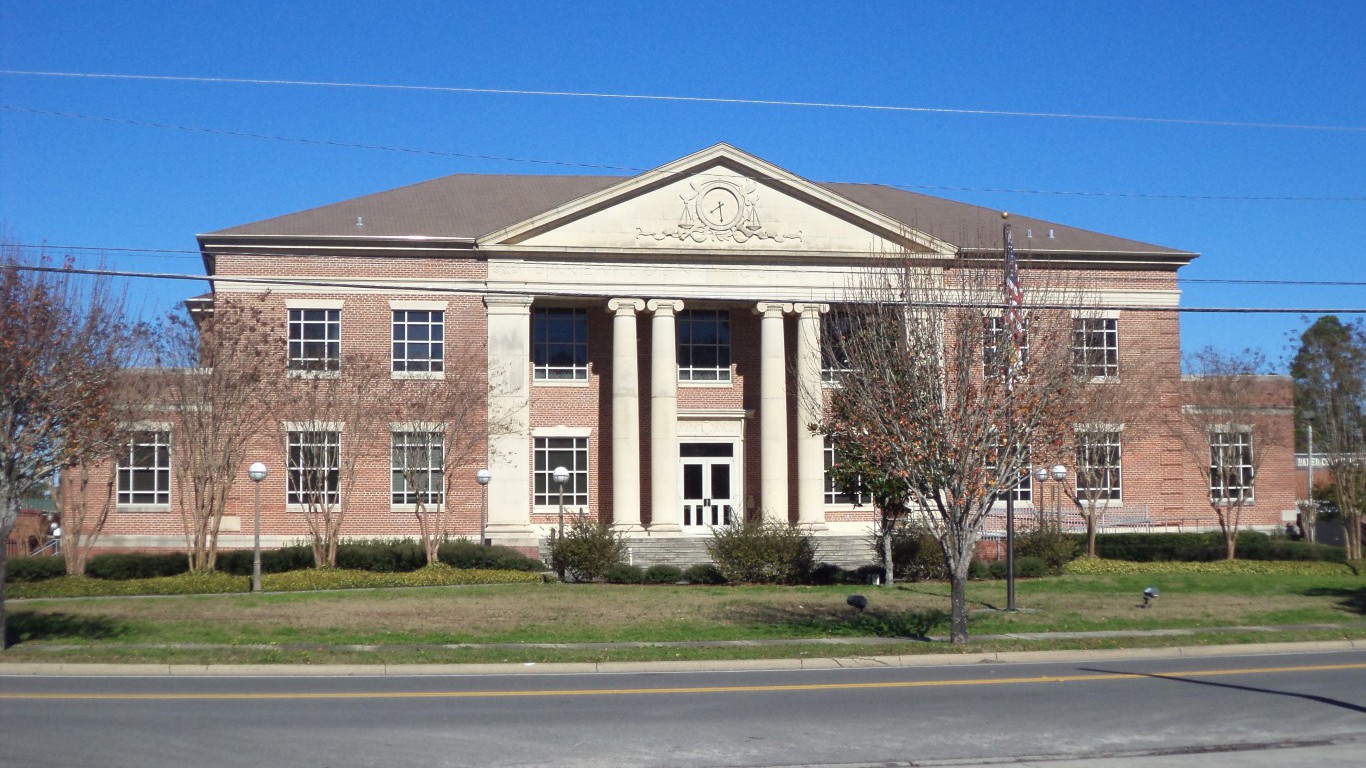
9. Florida
> Reddest county: Baker County
In 2012, Romney won 79.0% of the votes cast in Baker County. The most Republican leaning county in the state, Baker County voters have helped elect Republican Ander Crenshaw to the U.S. House of Representatives in each of the last five congressional elections. Florida Senator Marco Rubio is currently vying for the GOP’s presidential nomination.
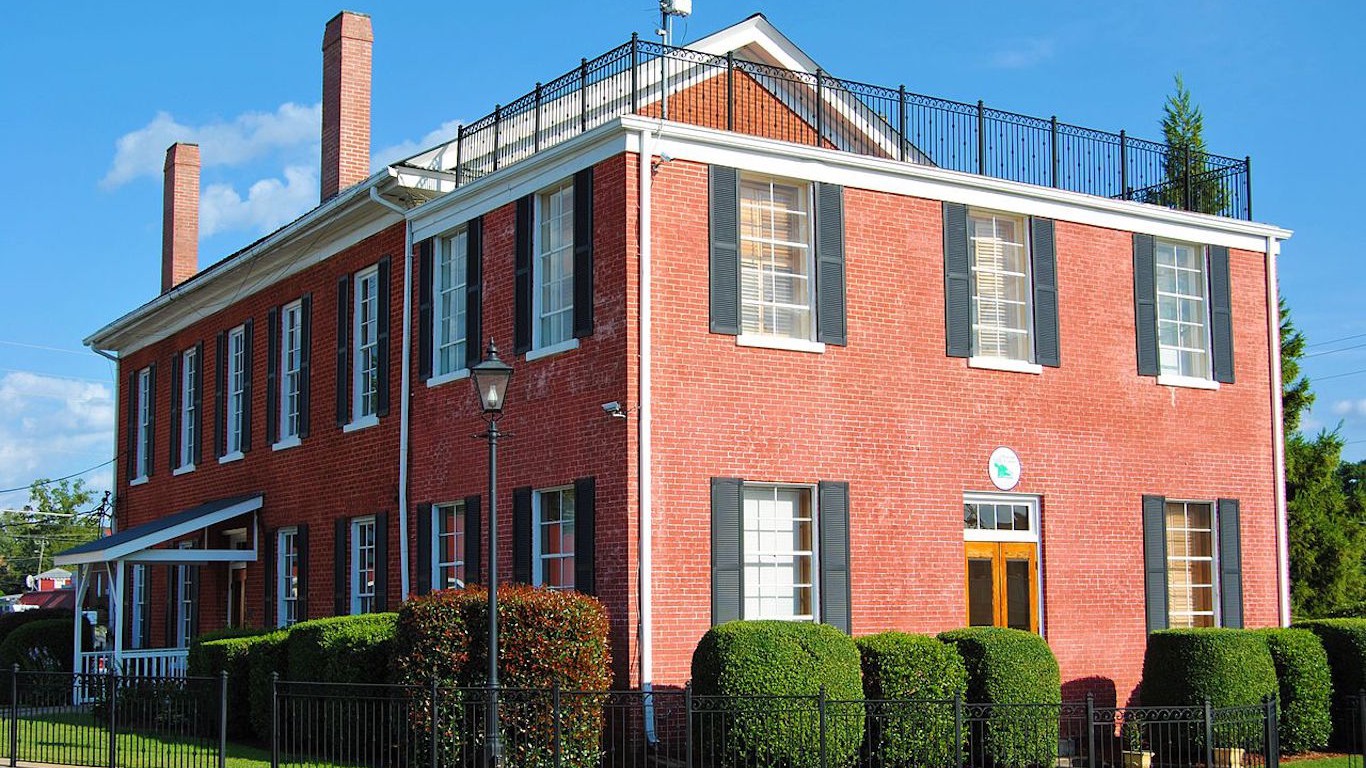
10. Georgia
> Reddest county: Dawson County
Romney won 86.4% of the 2012 votes cast in Dawson County, the highest share of any county in Georgia. Additionally, in each of the last five congressional elections, county voters have helped elect a Republican to Washington. Like many of the most Republican-leaning counties nationwide, the racial composition of Dawson County residents is not especially diverse, with 92.8% of residents identifying solely as white.

11. Hawaii
> Reddest county: Honolulu County
The birthplace of President Obama, Hawaii is perhaps the bluest state in the country. Obama received 71.0% of state votes in the 2012 election, the highest share from any state. While Honolulu County is the most Republican county in Hawaii, Obama still received 68.9% of county votes — higher than in most places in the country. Democratic leanings in Honolulu County go beyond the state’s admiration for Obama. In the last five House elections, only one Republican has won a seat within the two congressional districts that cover Honolulu County.
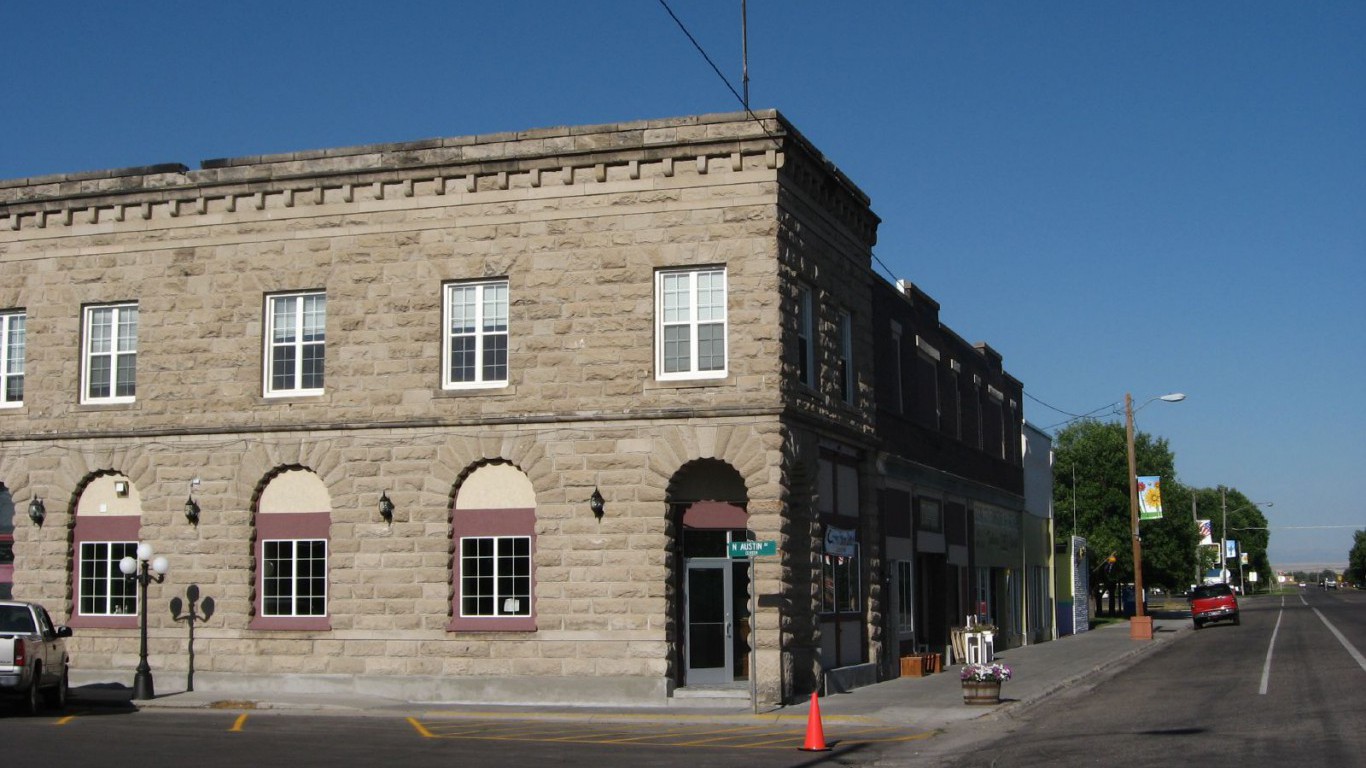
12. Idaho
> Reddest county: Madison County
Romney received 65.0% of the Idaho popular vote in 2012, making it one of the most Republican states in the country. In Madison County, the reddest county in Idaho, election results were even more decisive, with 93.3% of the votes going for Romney — the highest share in Idaho and the second highest share nationwide. The county’s relatively large Mormon settlement helps explain the overwhelming Republican majority in the area. Religious voters in general and Mormons in particular tend to lean right.
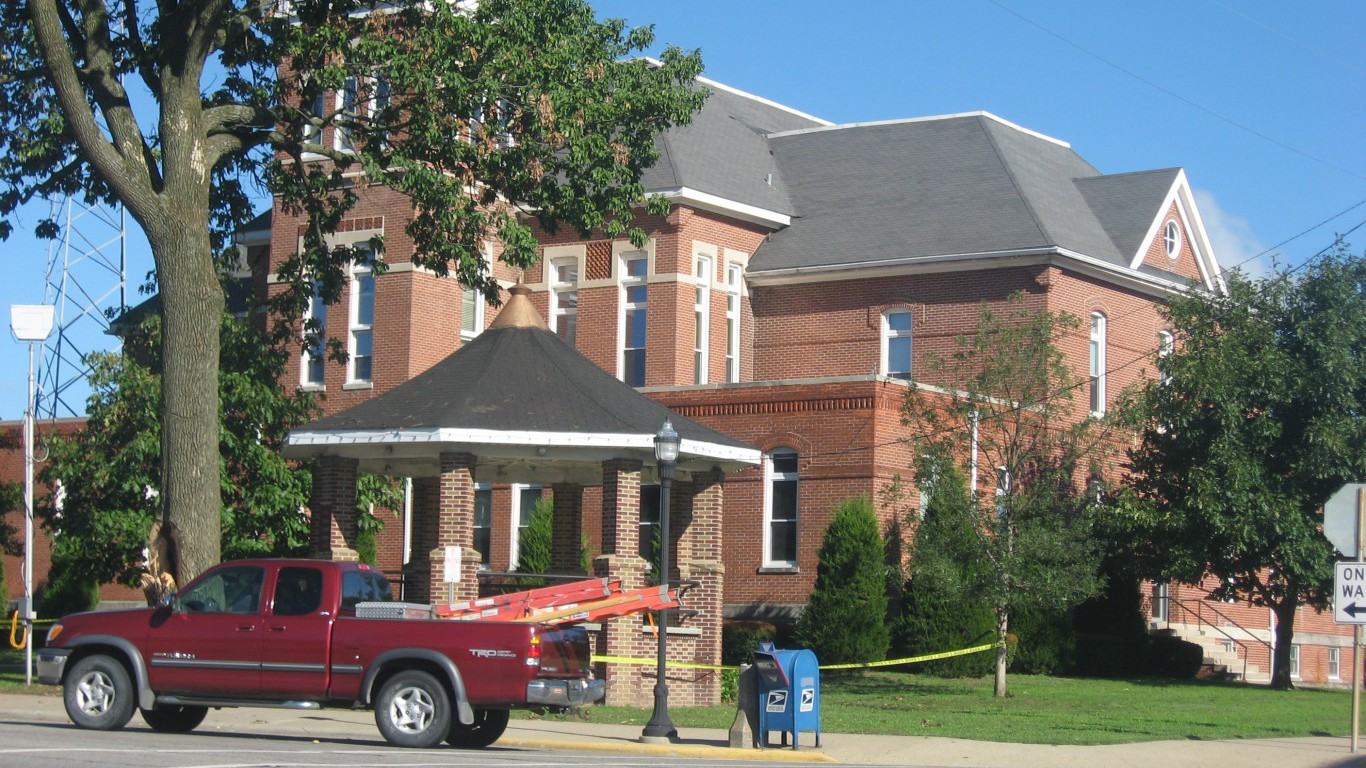
13. Illinois
> Reddest county: Wayne County
Obama started his political career in Illinois as a political organizer, later going on to win election to the Senate by the largest margin in Illinois history. However, admiration for Obama is not ubiquitous across the state. In 2012, just 19.7% of Wayne County voters voted for Obama, while 78.0% of voters favored Romney. As is the case in many other Republican-leaning areas, the vast majority of Wayne residents are white. Approximately 97% of Wayne residents identify as white, far higher than the 62.8% national average and in stark contrast with the minority of residents who identify as white in Illinois’s bluest county, Cook.
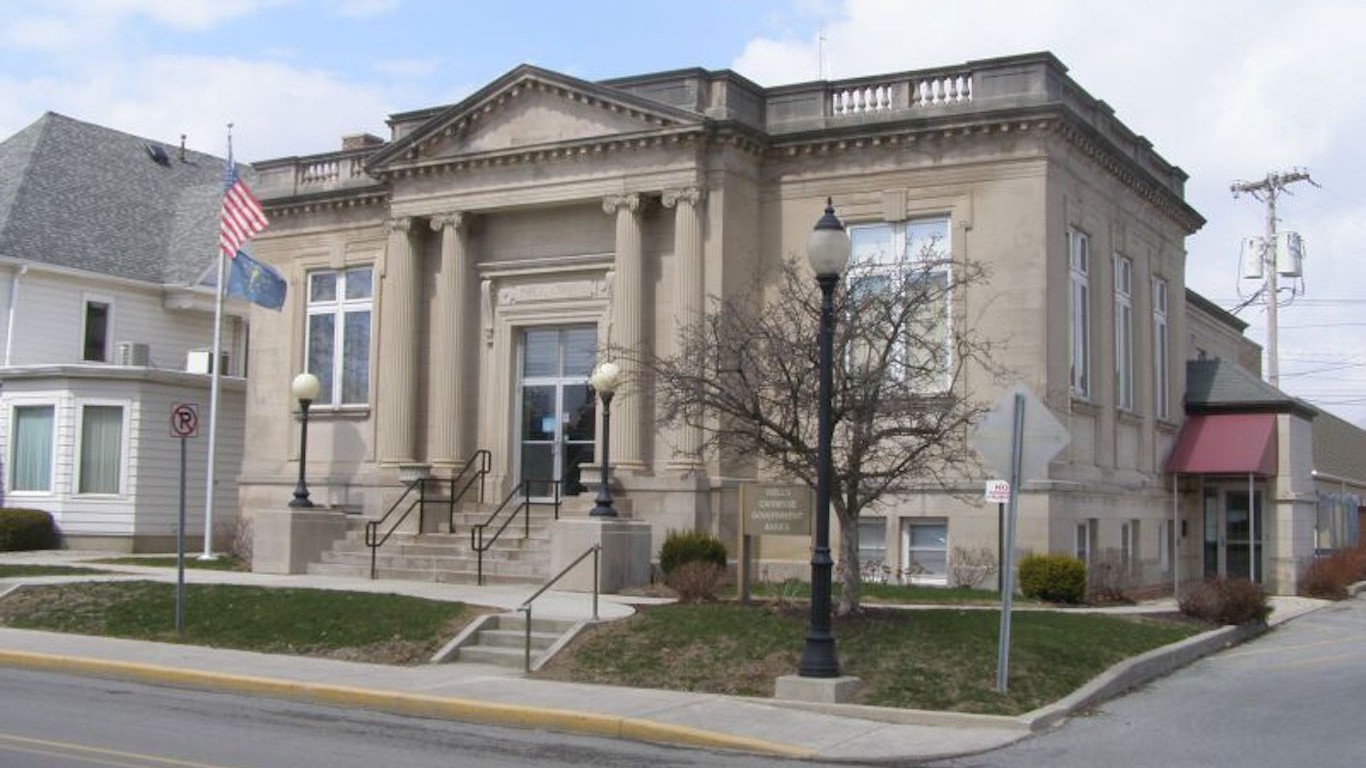
14. Indiana
> Reddest county: Wells County
In Indiana, 54% of votes went to Romney and 44% went to Obama in 2012 — one of the tighter election margins in the country. However, not all parts of the state were so politically divided. Approximately 72% of votes in Wells County went to Romney, the highest share of any Indiana county except Kosciusko and Daviess counties. Unlike other counties, however, Wells County is represented by the state’s 3rd district, a seat held by Republican Rep. Marlin Stutzman since 2010. Minorities, who typically provide a significant portion of Democratic election support, make up a very small share of Wells County residents and this may partially explain the strong Republican outcome. Approximately 96% of county residents identify as white compared to 62.8% of Americans nationwide.
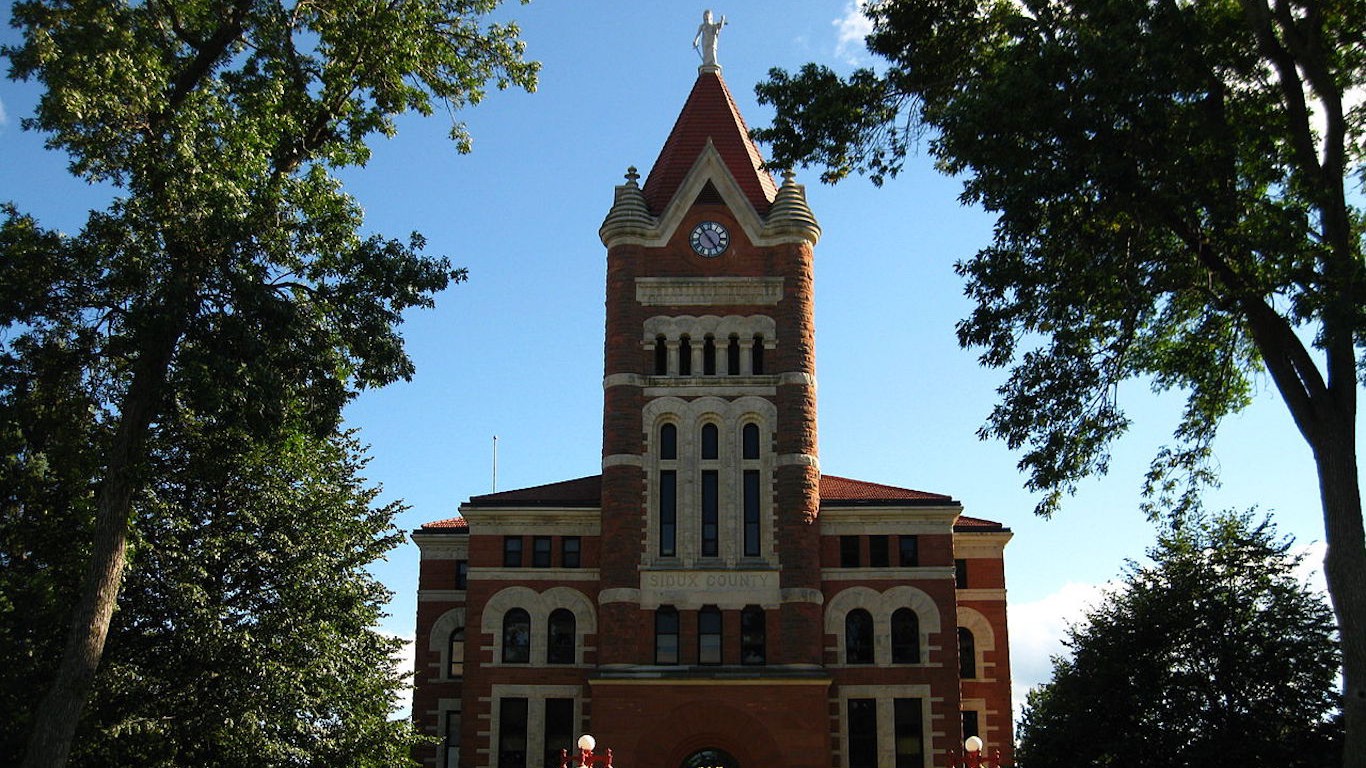
15. Iowa
> Reddest county: Sioux County
Iowa had one of the smallest margins in the 2012 election, with the respective shares of votes for Romney and Obama differing by just 6 percentage points. Not all parts of the state were as politically balanced. In Sioux County, 83.6% of voters cast ballots for Romney, the highest share in Iowa. In addition to voting for a Republican presidential candidate, Sioux County has helped elect a Republican to the House of Representatives in each of the past five congressional elections.
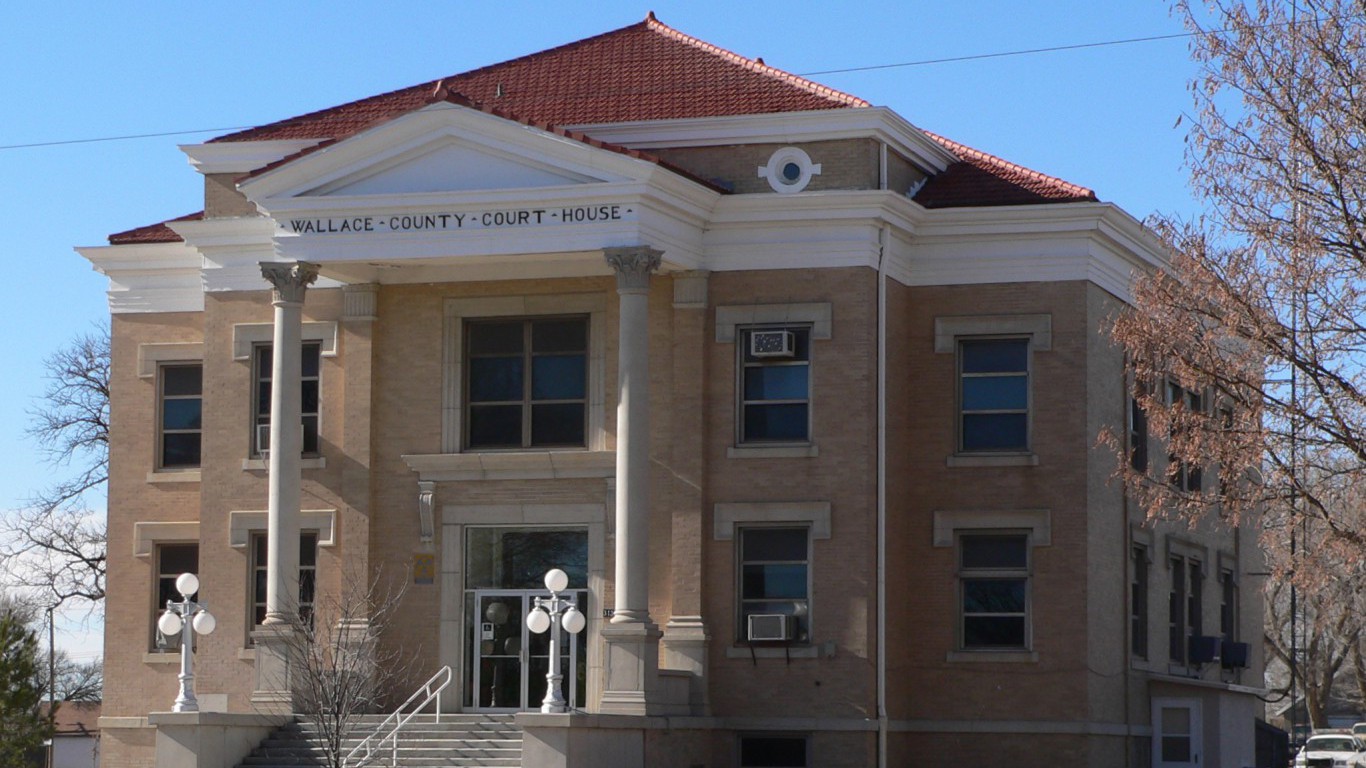
16. Kansas
> Reddest county: Wallace County
Romney won 89.9% of the 2012 votes cast in Wallace County, Kansas, compared to the 47.2% he received on a national scale. Regions of the country that skew Republican also tend to skew white, and Wallace County is no different — more than 95% of residents identify solely as white. Also like more Republican-heavy parts of the country, Wallace County residents are also less educated, with only 21.2% of adults attaining at least a bachelor’s degree, a smaller share than the 29.3% of American adults with such a degree.
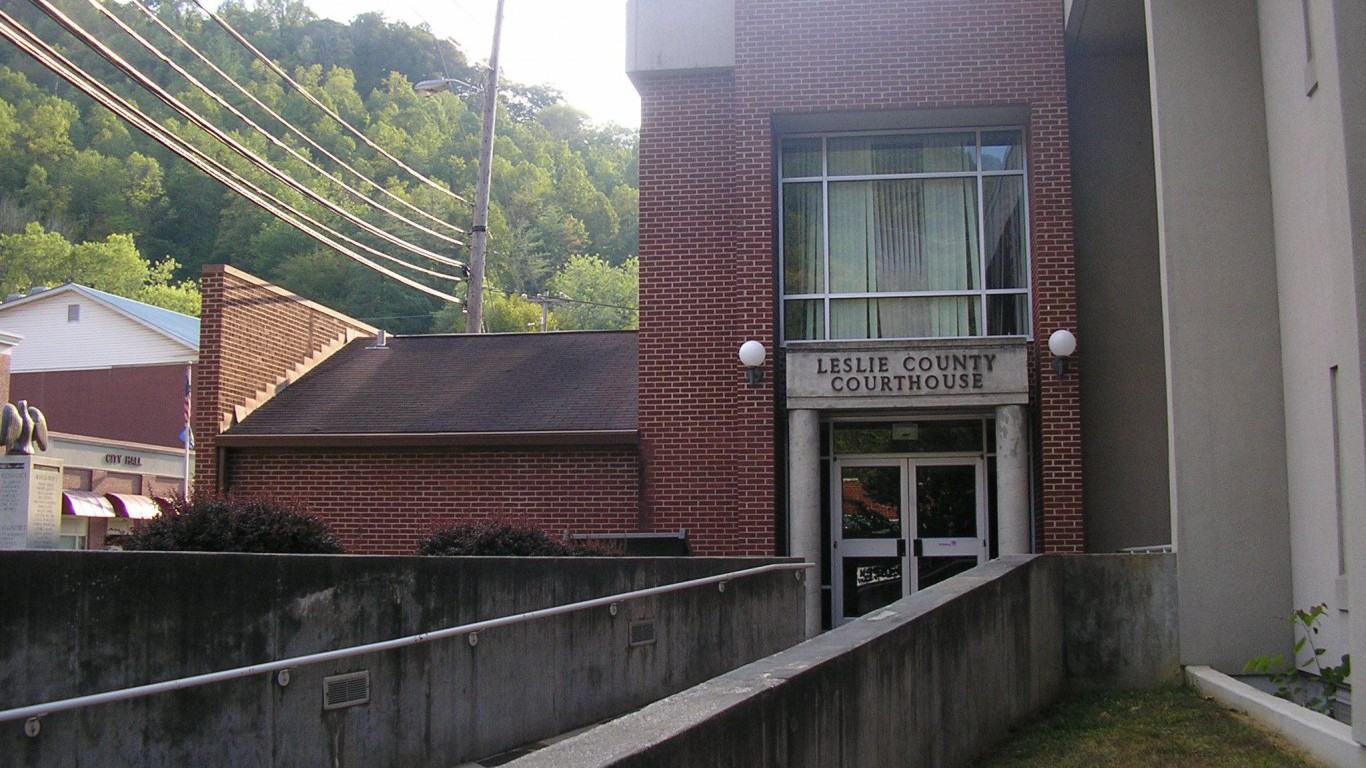
17. Kentucky
> Reddest county: Leslie County
Kentucky is a relatively conservative state and has voted for the Republican candidate in each of the last four presidential elections. In 2012, 61% of state voters preferred Romney. In Leslie County, 89.7% of those who went to the polls voted for Romney. Leslie County is represented in Congress by Republican Hal Rogers, who has been in office since 1981.
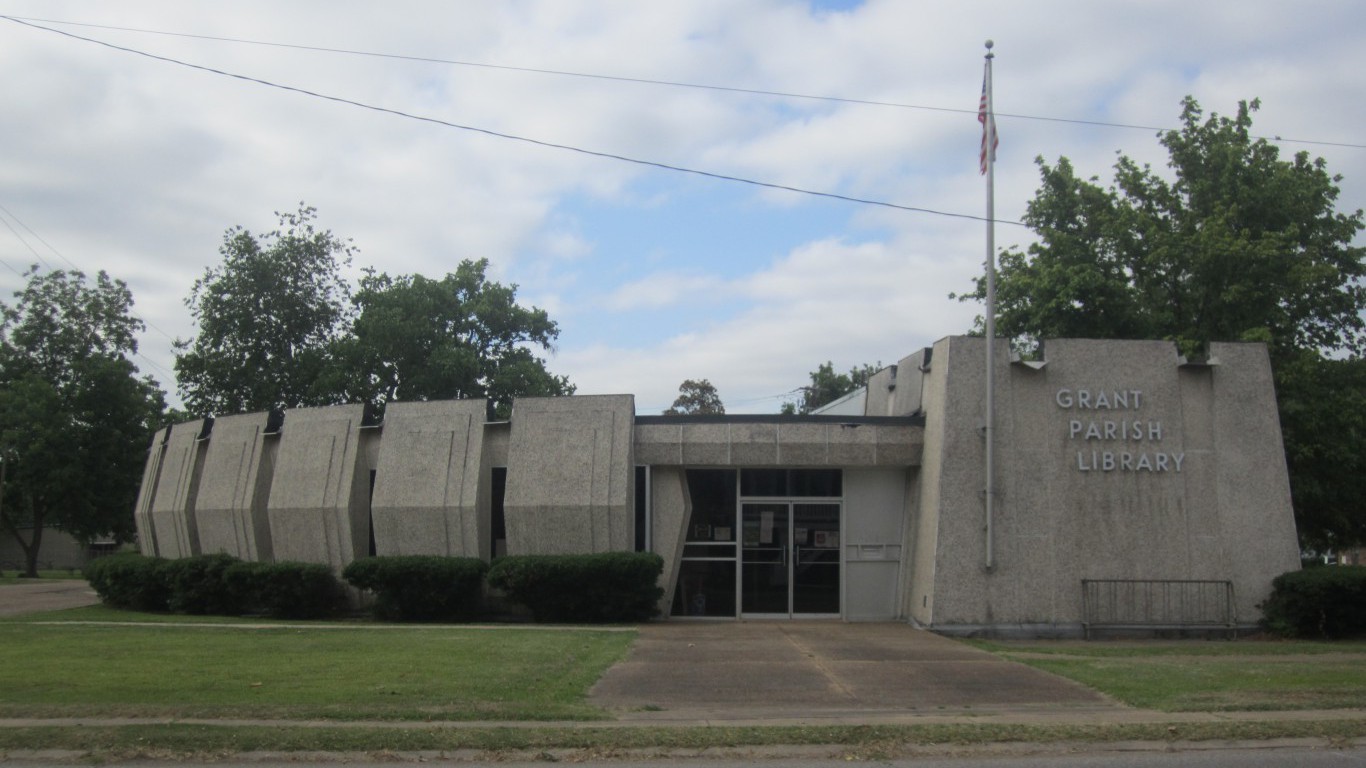
18. Louisiana
> Reddest county: Grant Parish
While Romney narrowly lost the 2012 presidential election, he received 81.7% of the votes in Grant Parish, the reddest county in Louisiana. Republicans are disproportionately white, as is Grant Parish, with more than 75.0% of residents identifying solely as white. Grant Parish is represented in the House by Republican Ralph Abraham. The senators from Louisiana are Bill Cassidy and David Vitter — both Republicans.

19. Maine
> Reddest county: Piscataquis County
While Maine went to Obama in 2012, Romney won 50.9% of the 2012 votes cast in Piscataquis County, the most of any county in the state. The county’s voting record on the congressional level, however, has not always supported Republicans. In four of the last five elections, county voters favored a Democrat. Most recently, however, Maine’s 2nd District, which includes Piscataquis, elected Rep. Bruce Poliquin, a Republican, to the House.
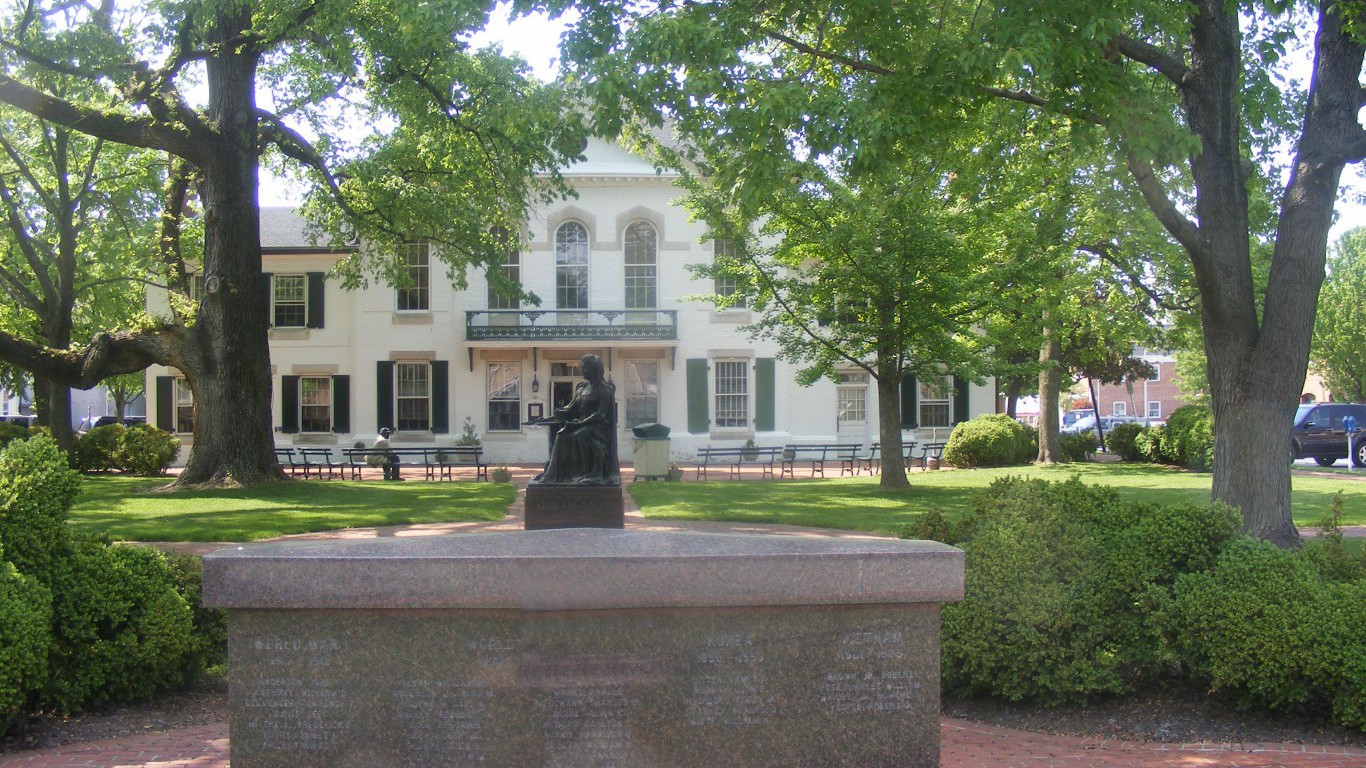
20. Maryland
> Reddest county: Queen Anne’s County
Queen Anne’s is the most Republican county in Maryland, with 64.3% of voters casting a ballot for Romney in 2012, even as 62% of state voters supported Obama. Both senators from the state are Democrats, but Queen Anne’s County is represented in the House by Republican Andy Harris of the state’s 1st district.
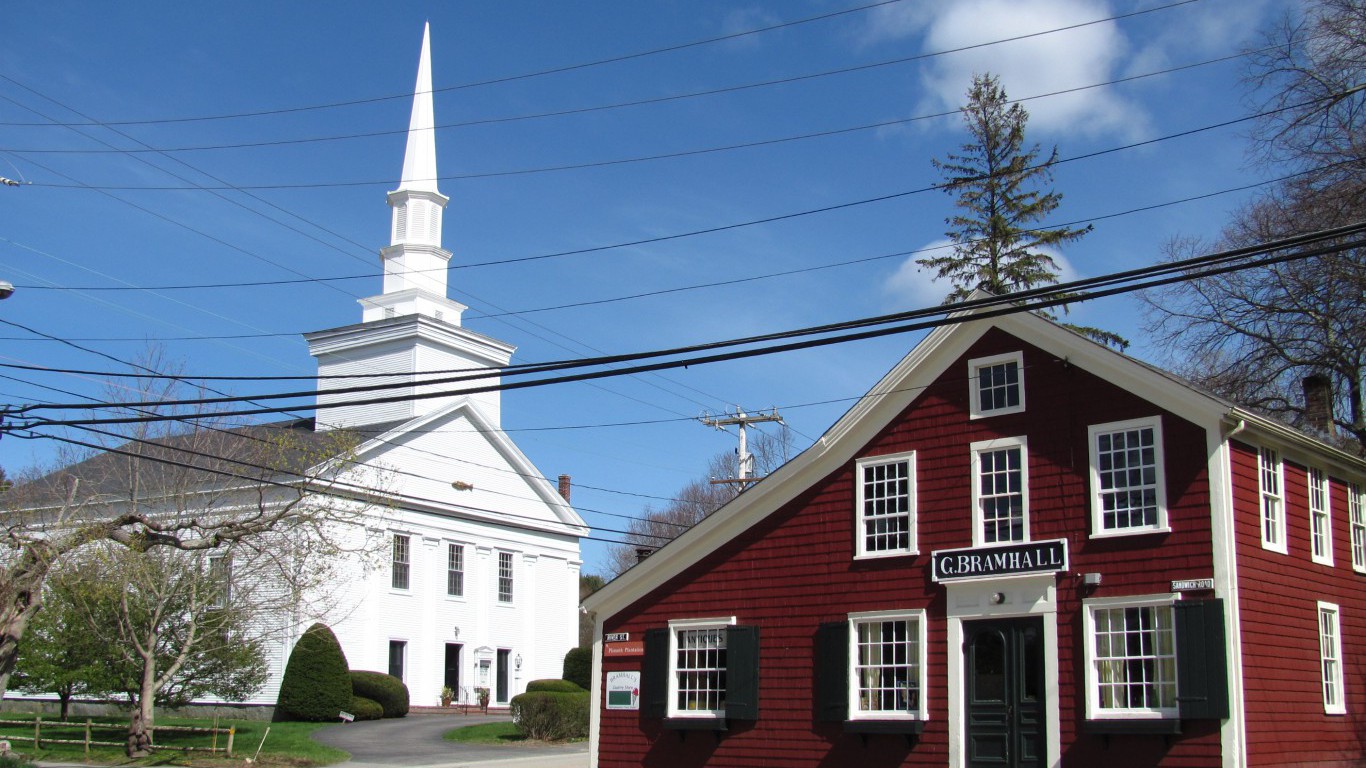
21. Massachusetts
> Reddest county: Plymouth County
With Romney receiving 47.5% of the county’s votes, Plymouth is the Massachusetts county with the most votes cast for the 2012 Republican presidential nominee. Much of the state votes Democrat, however, as all nine of the state’s representatives in the House are Democrats. With the exception of Republican Scott Brown’s brief stint as a senator following the death of Edward “Ted” Kennedy in 2009, both of Massachusetts’ Senate seats have historically been held by Democrats.
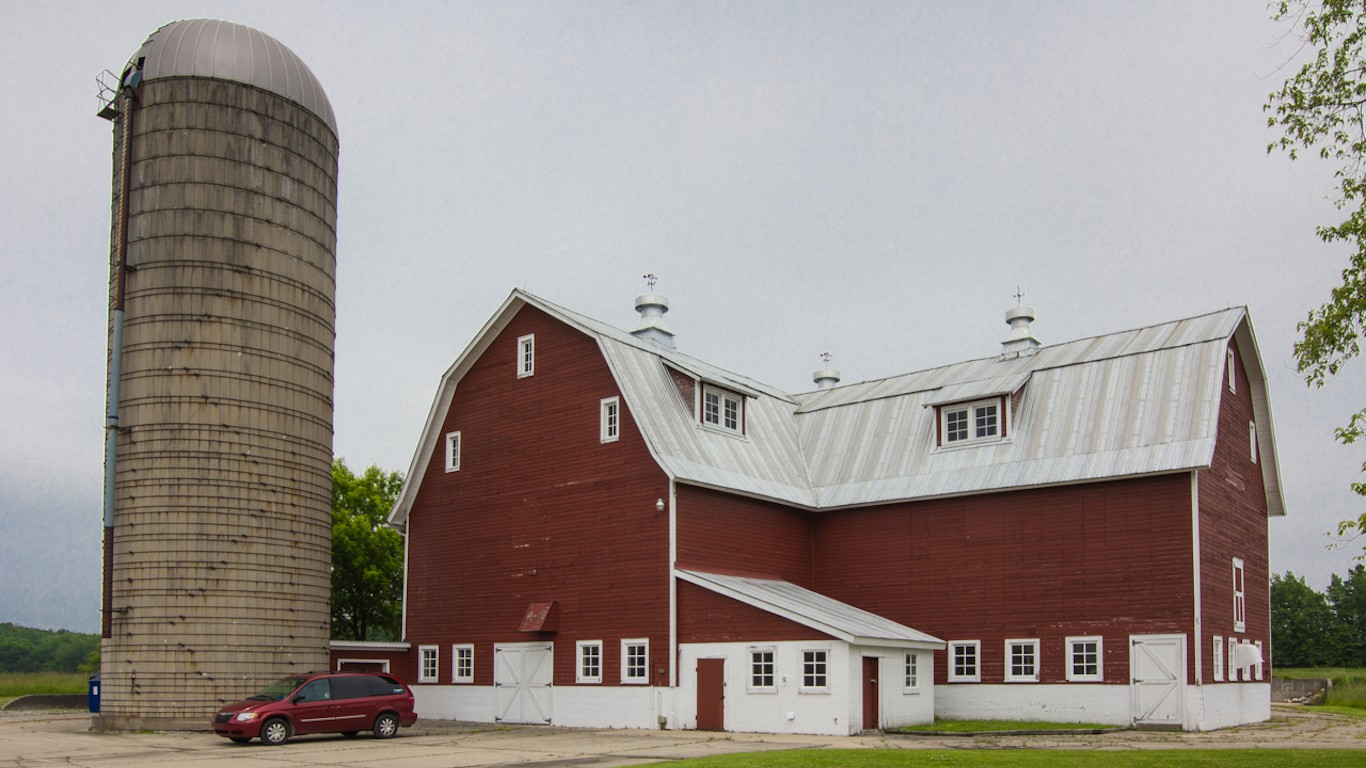
22. Michigan
> Reddest county: Ottawa County
Michigan has gone to a Democrat in every presidential election since 1992, including supporting President Obama in 2012 with 54% of the votes. In Ottawa County, however, 66.7% of the votes were for Republican candidate Romney, the highest share of any county in Michigan. Unlike predominantly Republican counties in most states, more than 30% of residents have at least a bachelor’s degree, a slightly higher educational attainment rate than the national rate.
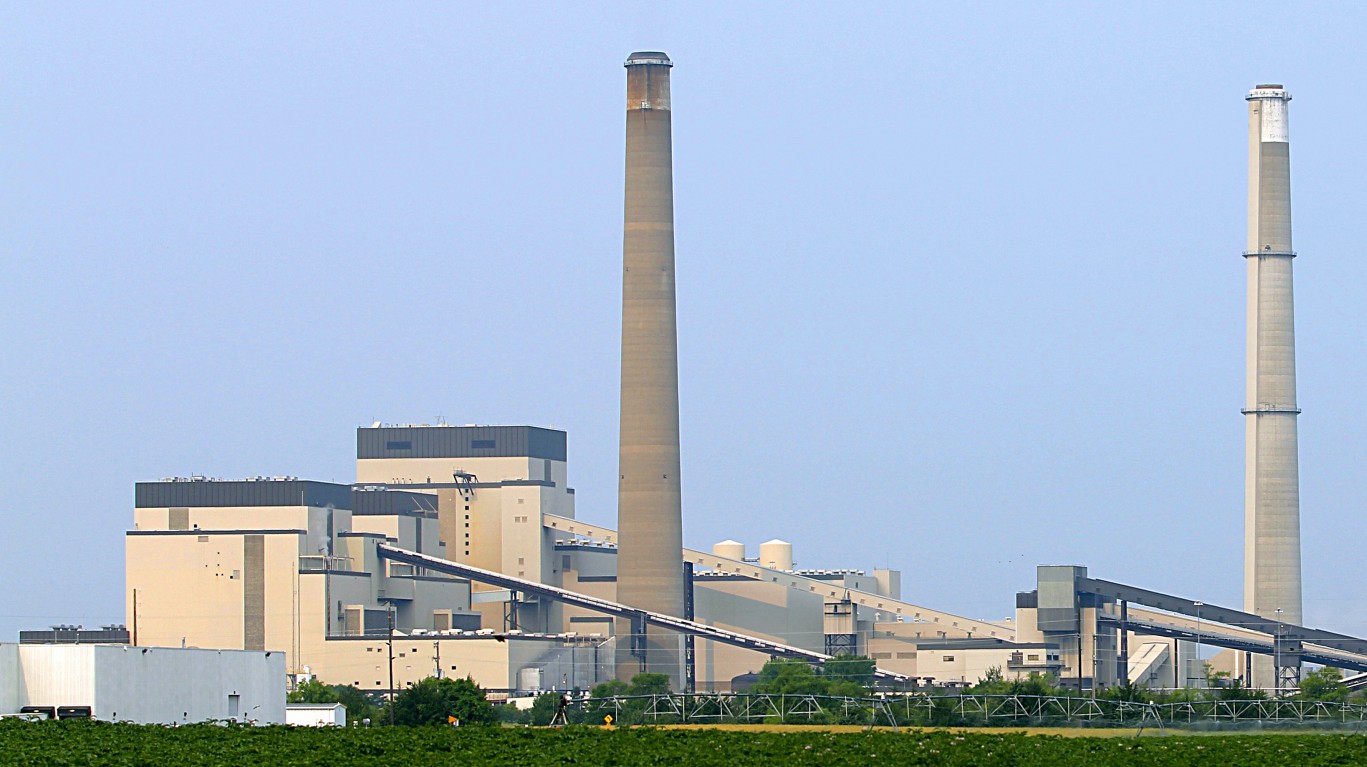
23. Minnesota
> Reddest county: Sherburne County
Romney won 60.1% of the 2012 votes cast in Sherburne County. Like many heavily Republican parts of the nation, a very high 92.6% of residents of the county identify as white. Sherburne County is part of the state’s 6th district, previously held by Republican and Tea Party stalwart Rep. Michele Bachmann until her retirement in 2014. Republican Rep. Tom Emmer now holds the seat.
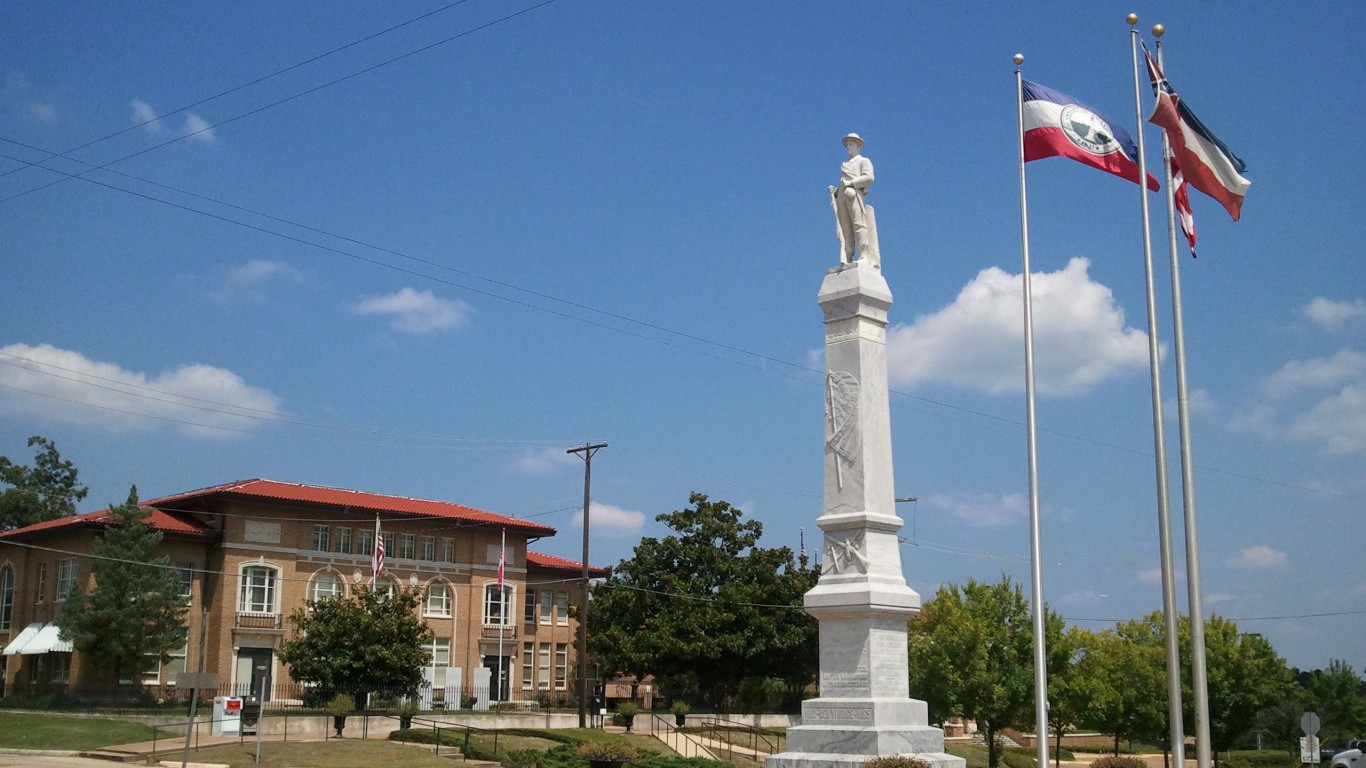
24. Mississippi
> Reddest county: Rankin County
Rankin County is represented in the House by Republican Gregg Harper. The senators from Mississippi, Thad Cochran and Roger Wicker, are also both Republicans. In 2012, Romney won 75.4% of the 2012 votes cast in Rankin County.
As is the case in a number of other Republican-leaning counties, Rank residents are less likely to live in poverty than Americans nationwide but also tend to be less educated. About 11.4% of county residents live in poverty, less than the national poverty rate of 15.6%. Of adults in the county, 28.7% have at least a bachelor’s degree, slightly smaller than than the 29.3% of American adults with such a degree.
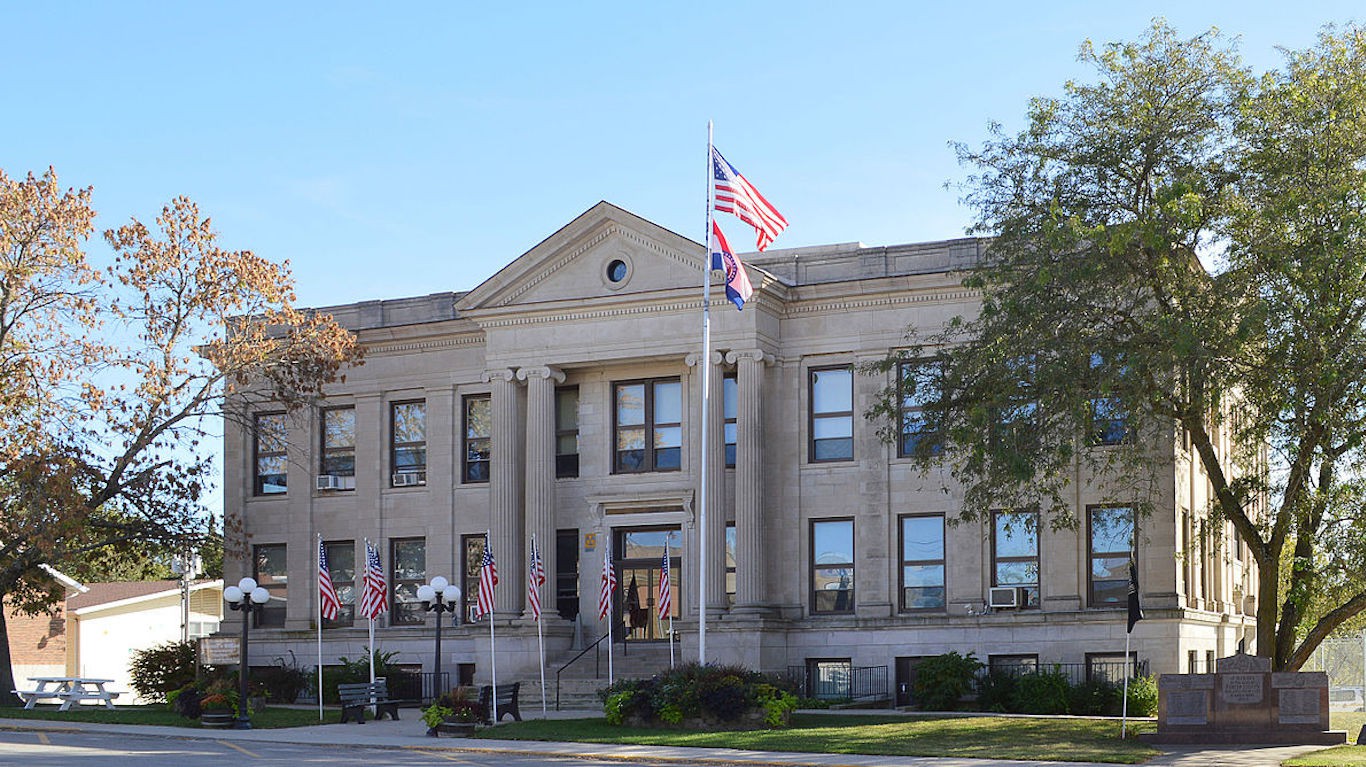
25. Missouri
> Reddest county: Mercer County
Romney won 75.8% of the 2012 votes cast in Mercer County, a higher share than in any Missouri county except for Osage and Barton counties. Unlike those counties, however, Mercer has been represented by Republican Rep. Sam Graves since 2001. As with other Republican-leaning counties, more than 90% of Mercer County residents identify predominantly as white, far higher than the 62.3% of Americans identifying as white.
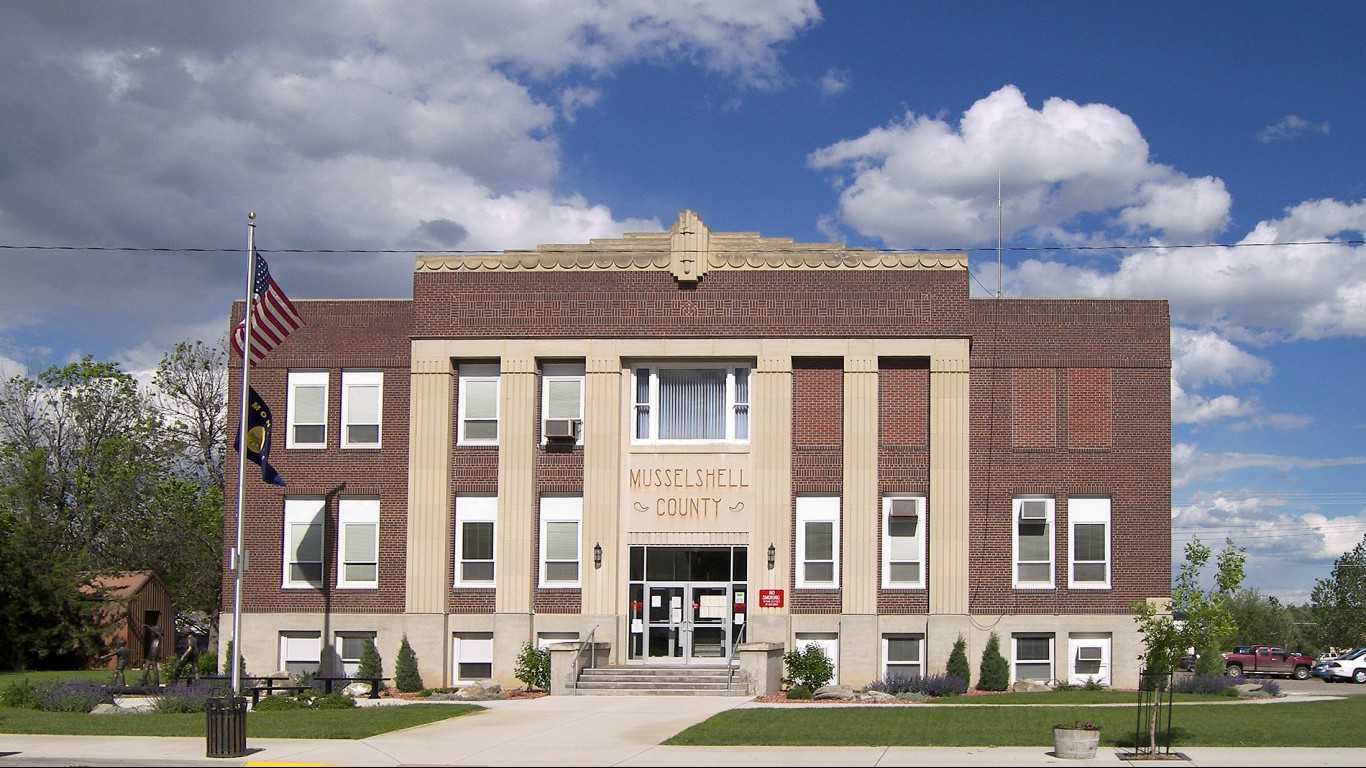
26. Montana
> Reddest county: Musselshell County
With 55.0% of votes going to Romney and 42.0% to Obama, Montana had one of the smaller margins of any state in the 2012 election. Not every part of the state is as politically divided, however. Approximately 76% of votes in Musselshell County went to Romney, the highest share in Montana. Areas with higher education attainment rates tend to lean Democrat. In the red-leaning Musselshell County, however, just 15.1% of adults have at least a bachelor’s degree, about half of the national rate.
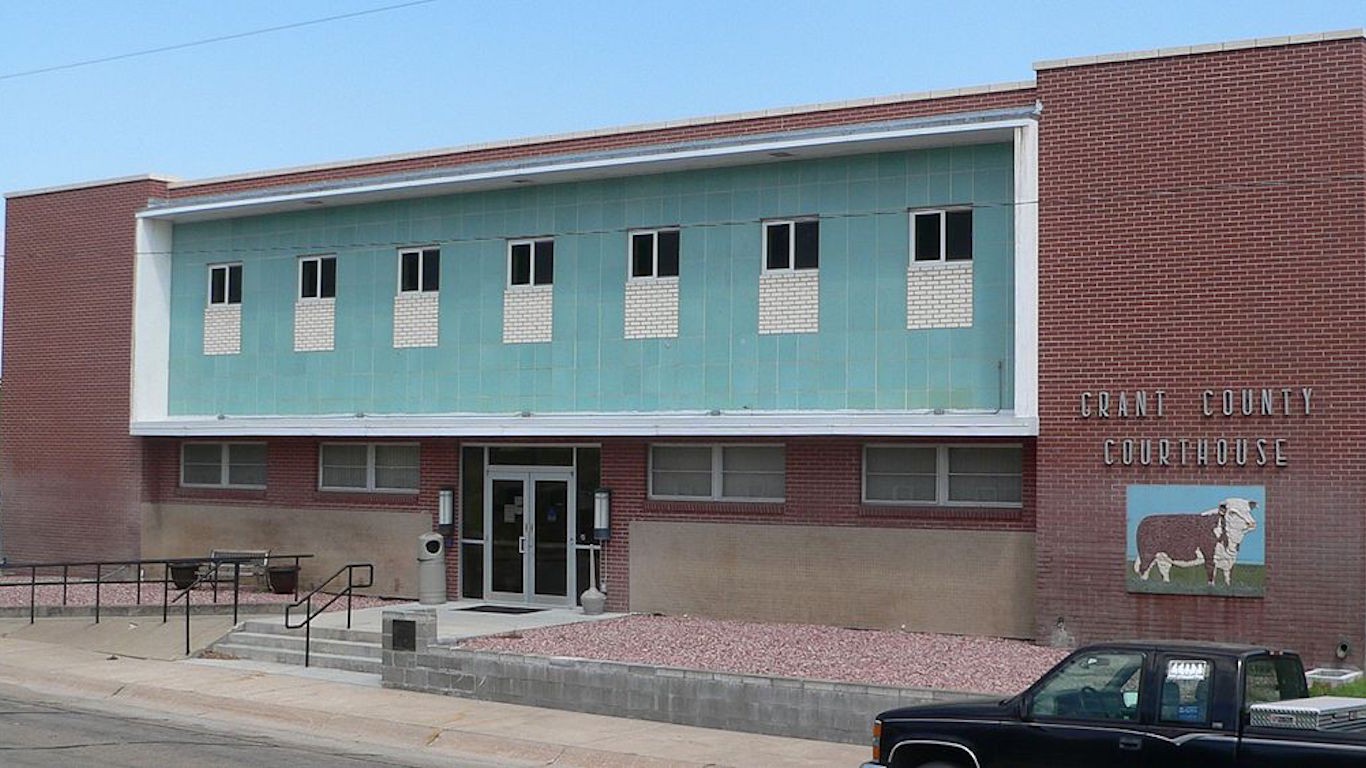
27. Nebraska
> Reddest county: Grant County
One of the smaller counties in Nebraska, Grant County has an estimated population of just 649 people. In the 2012 election, a total of just 30 votes were cast for Obama in Grant. The 8.3% share of votes was the smallest in Nebraska, one of the smallest in the country, and in stark contrast with Romney’s voter support from the area. Democrats often rely on votes among minority populations. Grant County, however, has few such residents, which could partially explain the Republican outcome. Just 2% of county residents identify as non-white in Grant County, one of the smallest shares in the country.
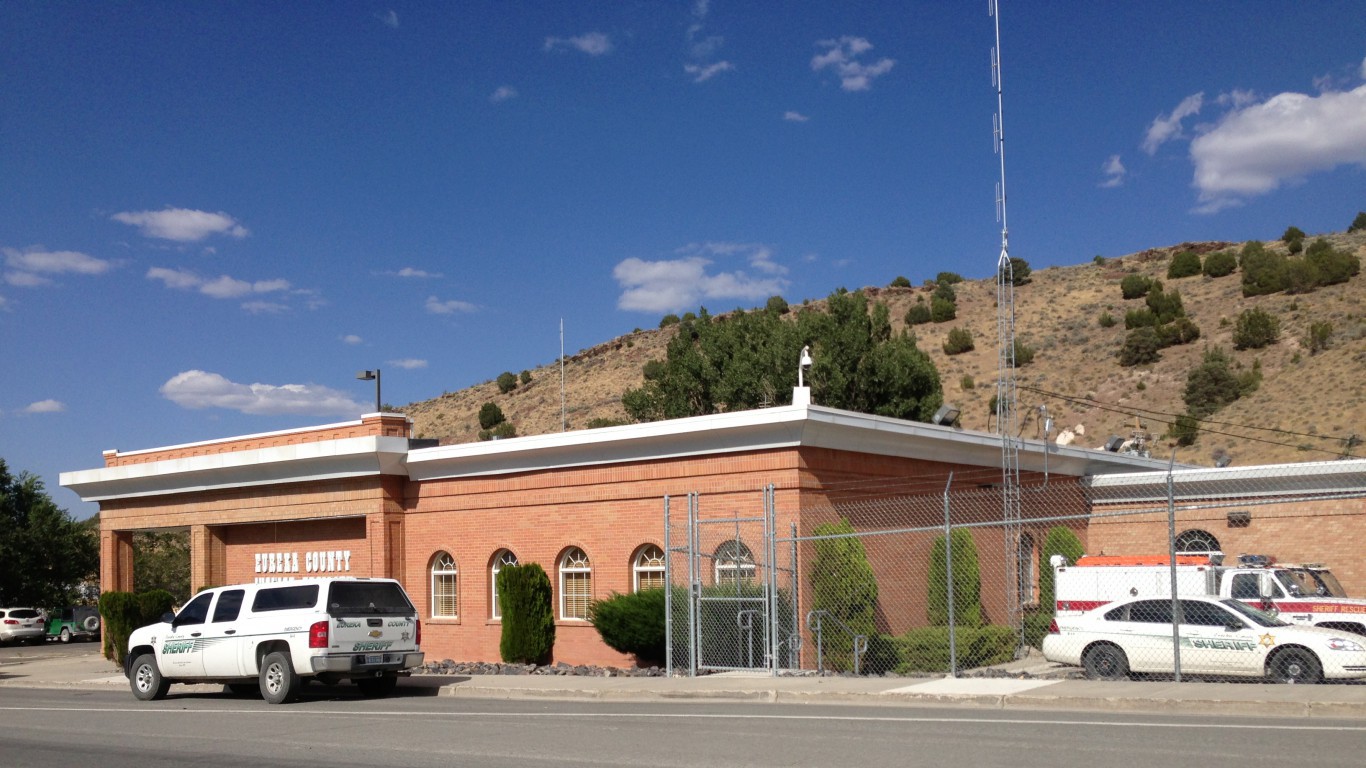
28. Nevada
> Reddest county: Eureka County
With 46% of votes going to Romney and 52% going to Obama, Nevada had one of the slimmest margins of any state in the 2012 election. In Eureka County, however, there was less division amongst voters. In the state’s reddest county, approximately 82% of the votes went to Romney and just about 13% went to Obama. In addition to voting Republican in the presidential election, Eureka County has helped elect a Republican to the House of Representatives in each of the last five elections.
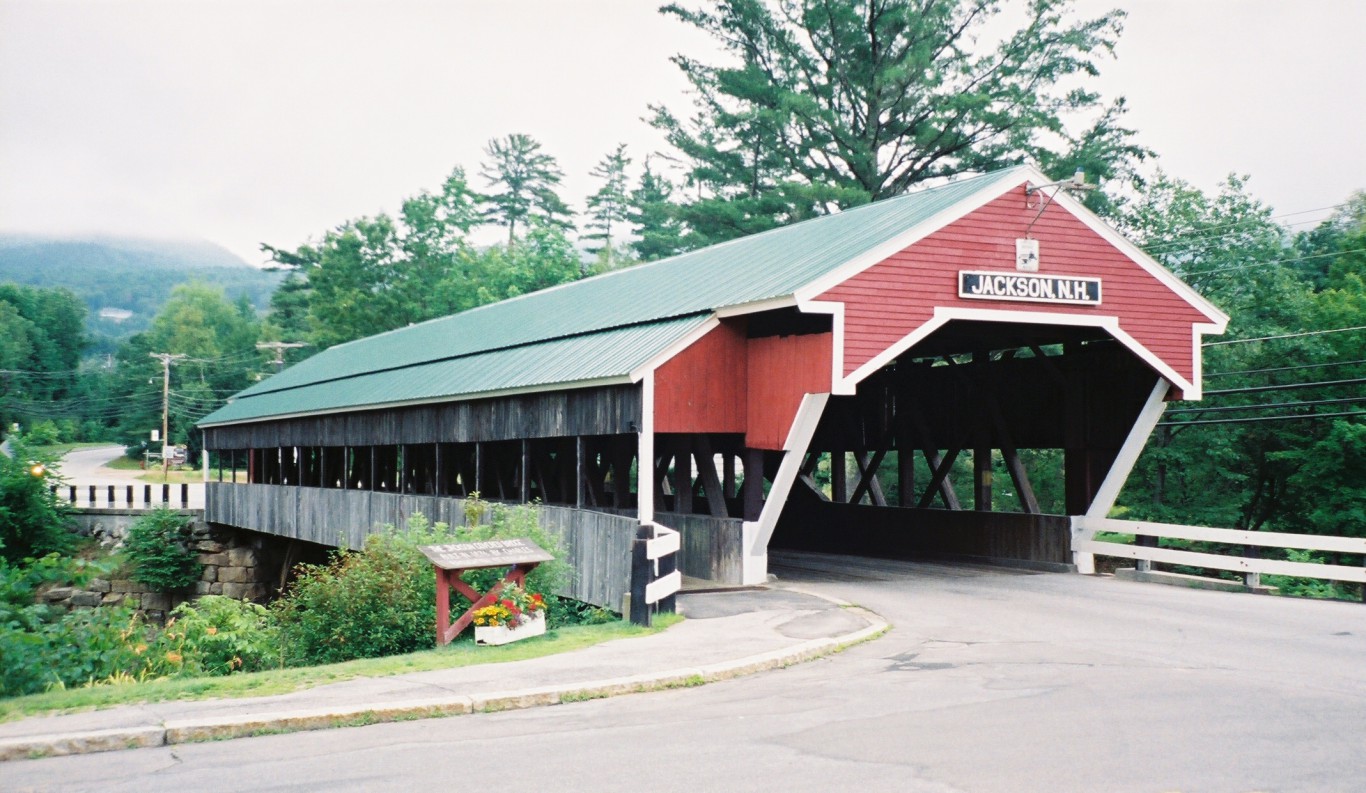
29. New Hampshire
> Reddest county: Carroll County
New Hampshire was one of the major swing states in the 2012 election, with just a 6 percentage point margin between Romney and Obama. Even in Carroll County, the state’s most Republican-leaning area, 49.9% of votes went to Romney and 49.1% went to Obama, a 1 percentage point margin. Over the past five congressional election cycles voters in Carroll have been slightly more likely to cast a ballot for a Republican to compared with voters in other New Hampshire areas.
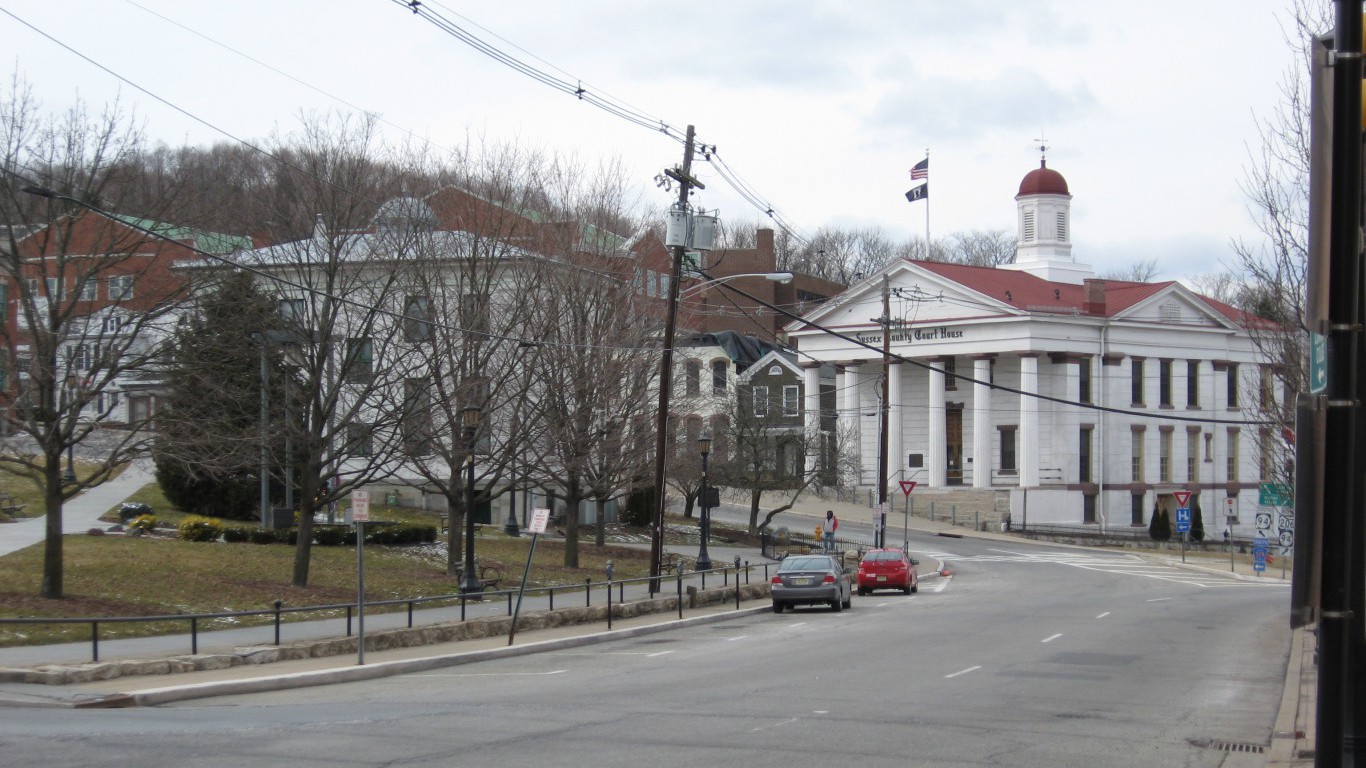
30. New Jersey
> Reddest county: Sussex County
With residents casting 60.3% of their votes for Romney, Sussex is the most Republican-leaning county in New Jersey. In addition to the county voting Republican in the presidential election, the two congressional districts that cover Sussex County have elected a Republican to the House of Representatives in the past five elections. Wealthy individuals often give support to Republican candidates, and incomes in Sussex County are very high. The median household income in the county of $87,397 is about $34,000 more than the typical American household annual income.
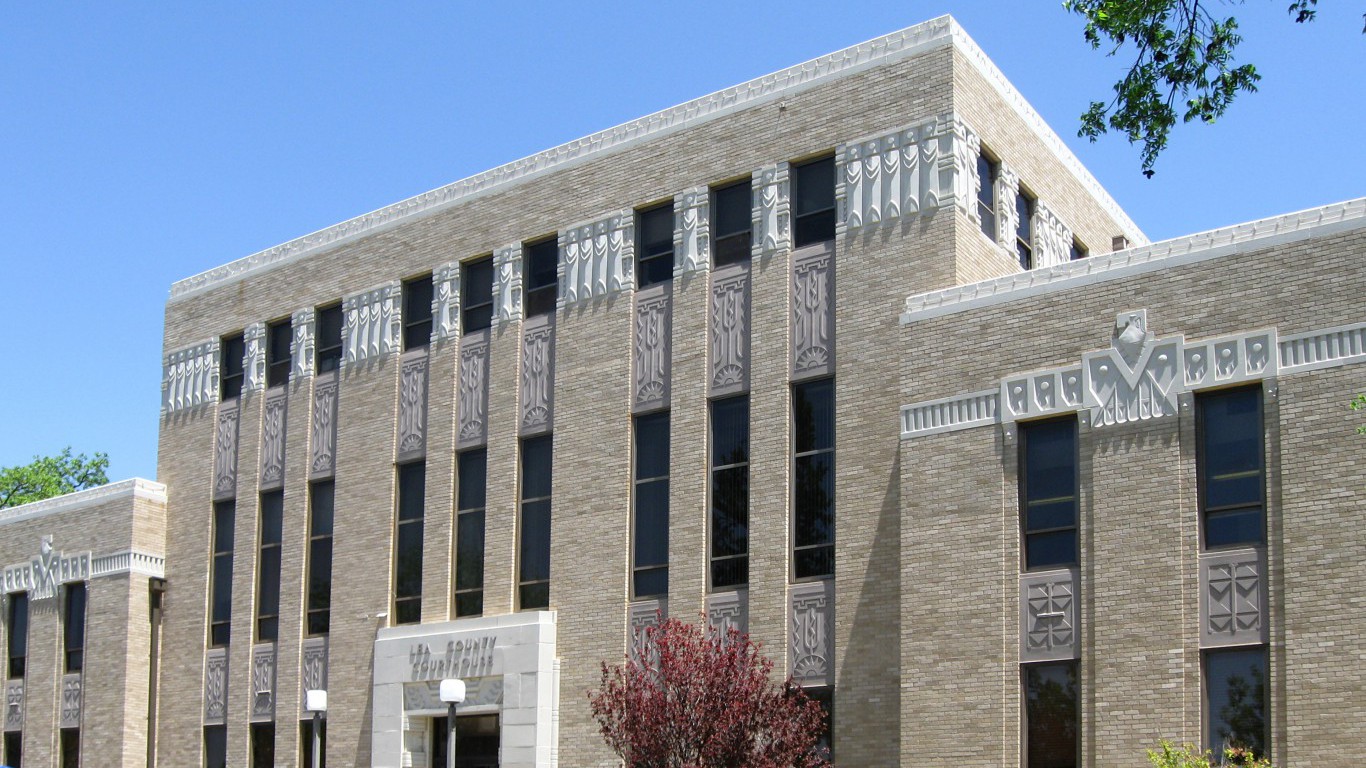
31. New Mexico
> Reddest county: Lea County
Despite a majority of New Mexico’s votes going to Obama, Romney won 73.7% of the 2012 votes cast in Lea County, the highest share of any county in New Mexico. The state’s 2nd District, which covers the southern half of the state and includes Lea County, is represented by Stevan Pearce, the only Republican of the state’s five delegates to Congress.
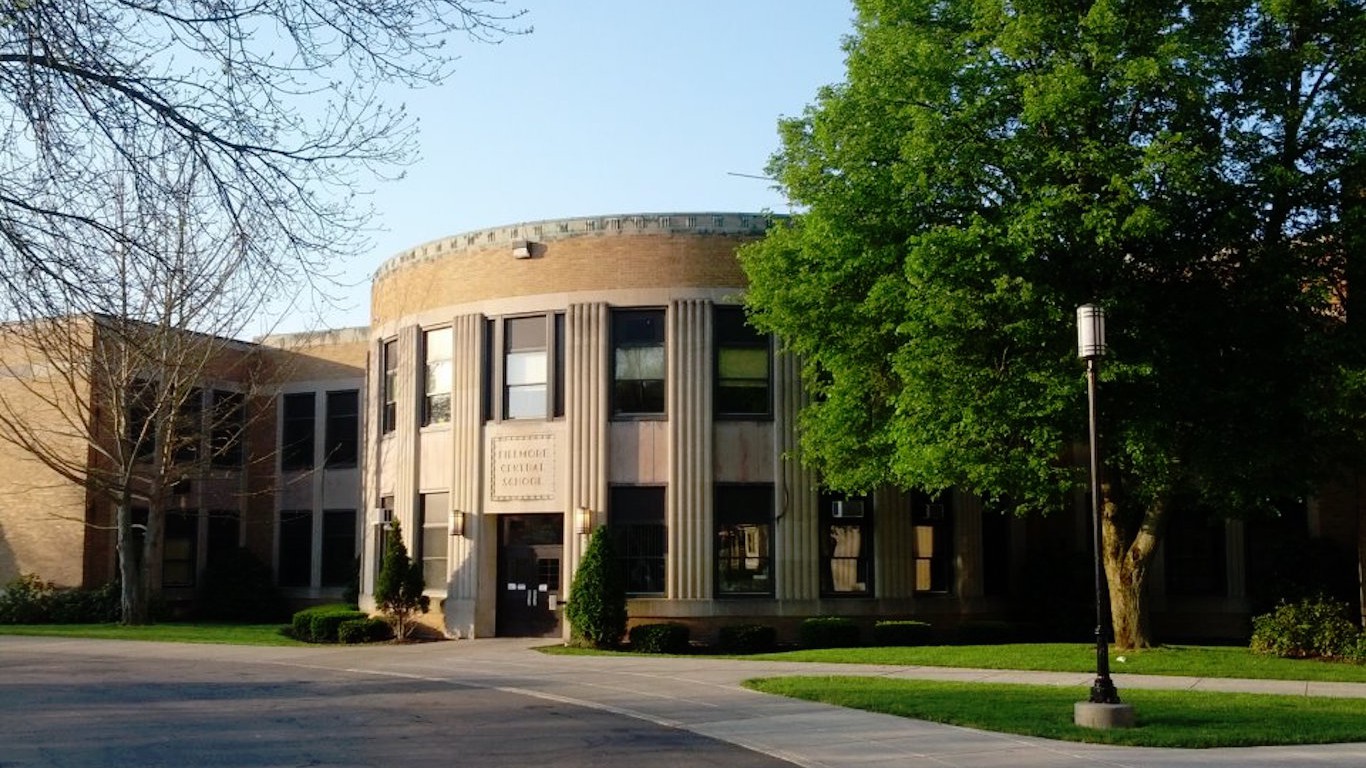
32. New York
> Reddest county: Allegany County
While a majority of Allegany County voted for Romney in the 2012 presidential election, the county’s voting record in congressional elections has not always supported Republicans. In two of the last five elections, county voters favored a Democrat to represent New York’s 23rd District. Republican Rep. Tom Reed II currently holds the seat. As in many other Republican-leaning counties, Allegany County residents are predominantly white, with nearly 95% of residents identifying solely as white.
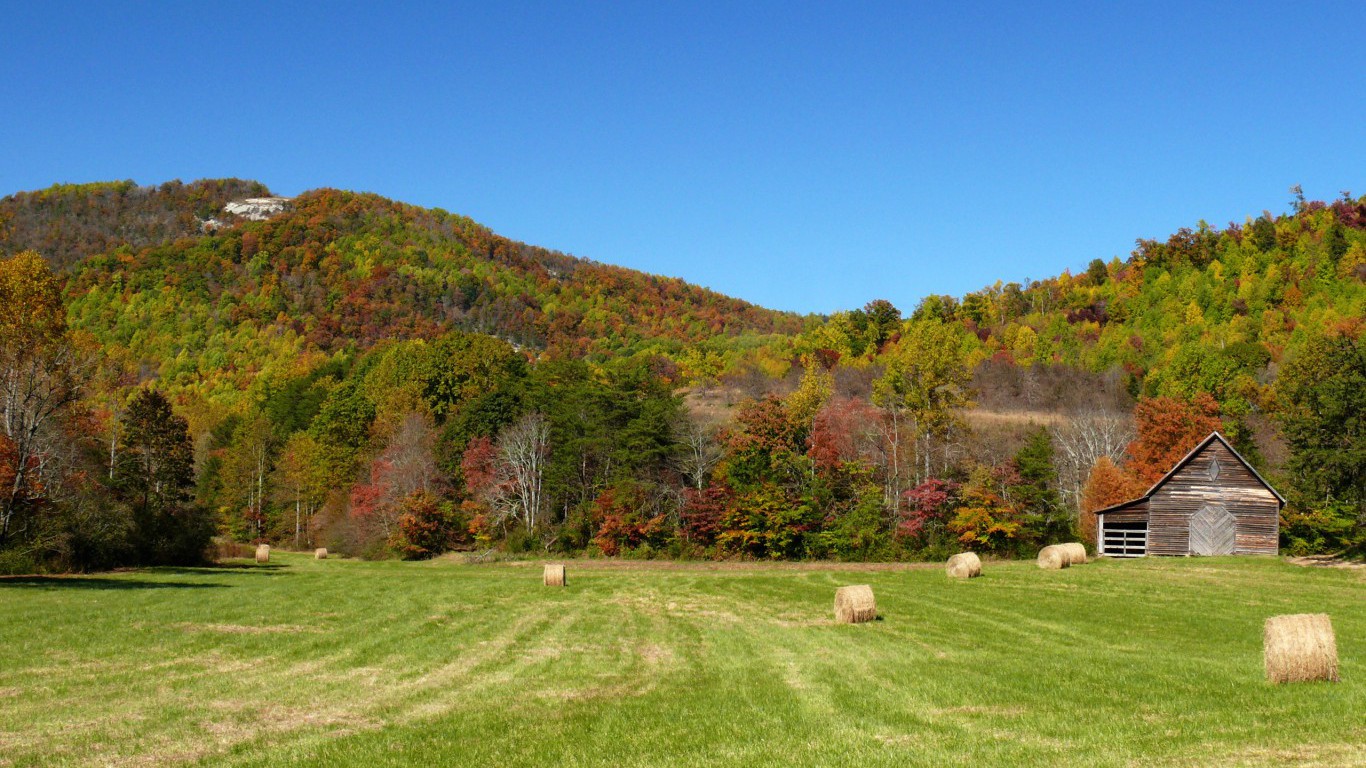
33. North Carolina
> Reddest county: Yadkin County
While Romney garnered majority support in North Carolina during the 2012 presidential election, only three of North Carolina’s 13 representatives in the House are Democrats. Yadkin County residents are among the most conservative. Three-quarters of the county’s nearly 17,000 votes were cast for Romney in 2012. Additionally, the county is represented by Rep. Virginia Foxx of the 5th District, who ranked among the most conservative members of Congress in separate studies by the National Journal and the American Conservative Union.
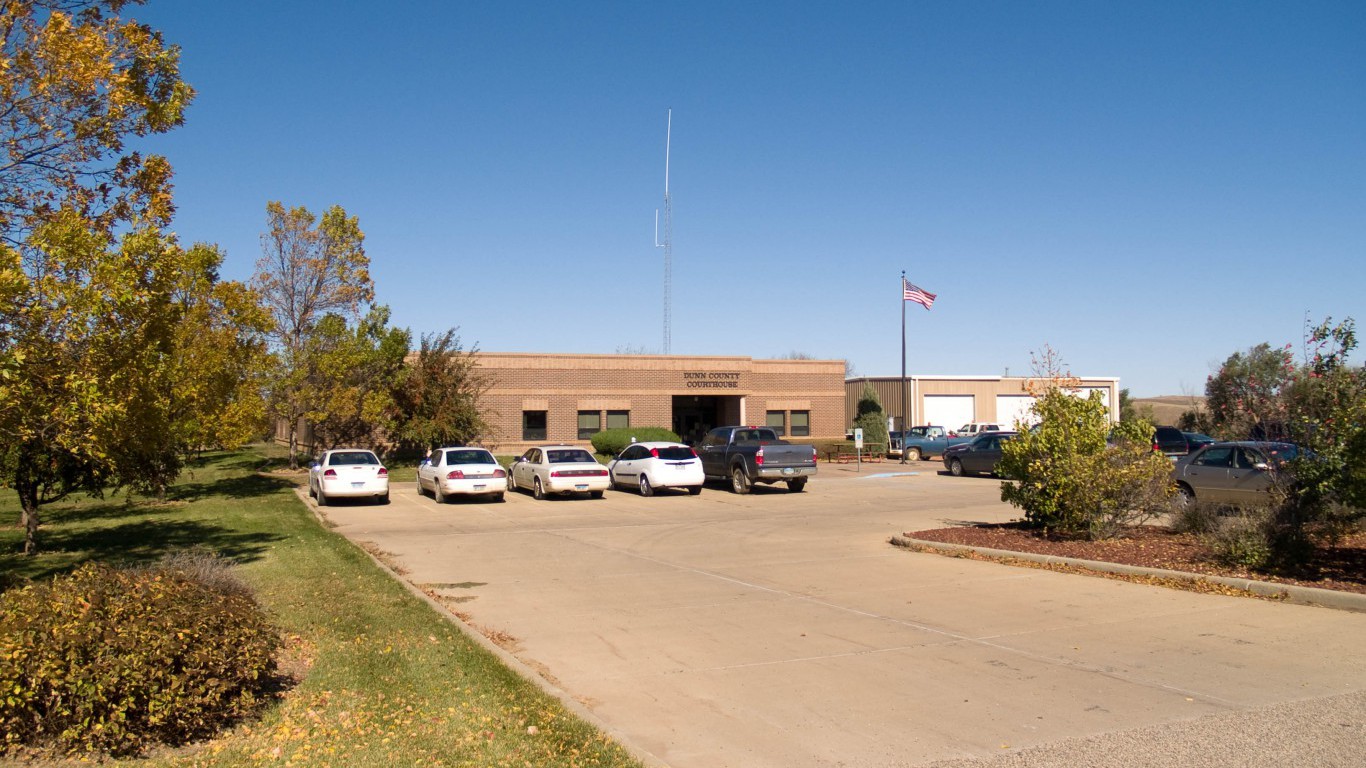
34. North Dakota
> Reddest county: Dunn County
Romney won 74.6% of the votes cast in Dunn County in 2012, the highest share of any county in North Dakota. One of just a handful of states with only a single congressional district, competition for House representation is steep. Democrat Earl Pomeroy was defeated by Republican Rick Berg in 2010 after holding the seat for nine terms. Rather than seek re-election to the House, Berg unsuccessfully challenged Democrat Sen. Heidi Heitkamp for one of the state’s two Senate seats. Republican Rep. Kevin Cramer currently represents North Dakota in the House.
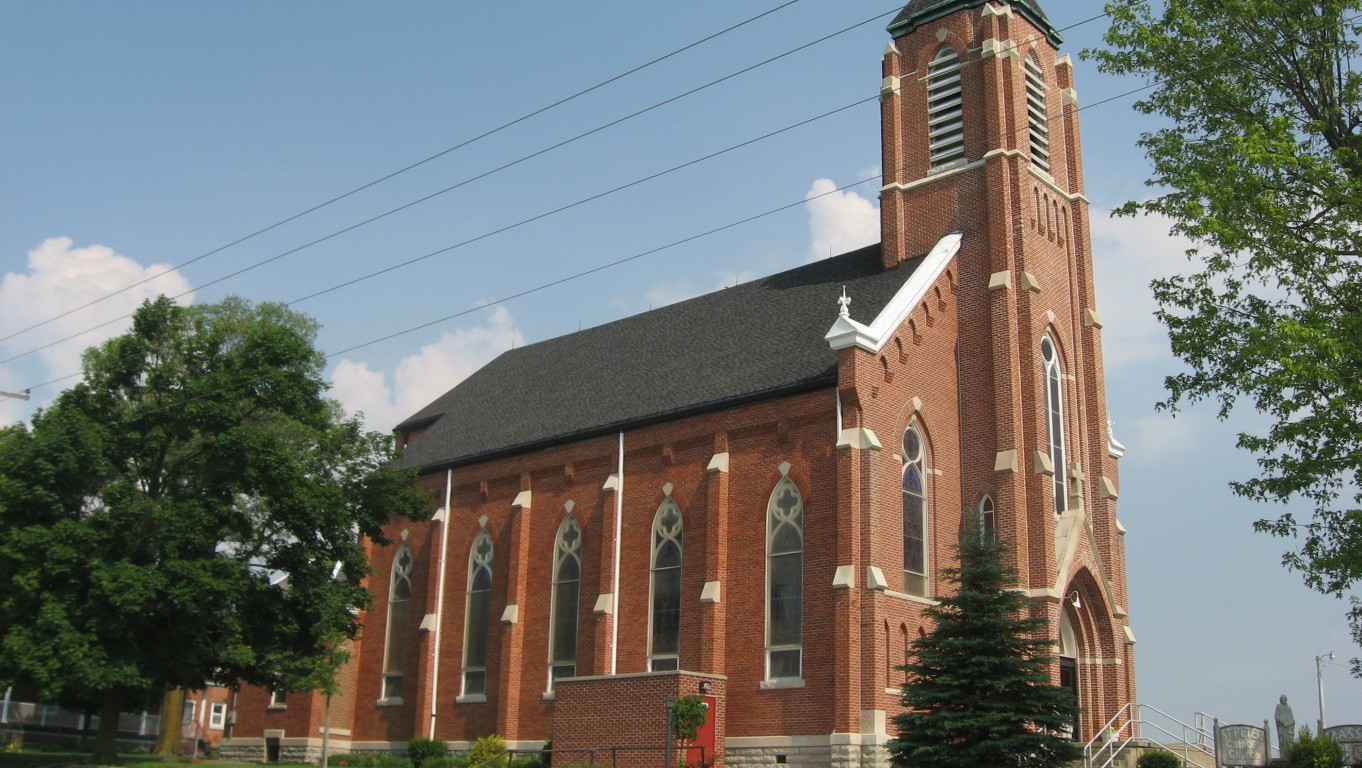
35. Ohio
> Reddest county: Mercer County
Romney won 76.6% of the 2012 votes cast in Mercer County, the highest share of any county in Ohio. In addition, all three of the congressional districts making up parts of the country are represented by Republicans, including, until October 2015, former Speaker of the House Rep. John Boehner. Like many other Republican-leaning counties, more than 96% of Mercer County’s residents identify as white, well above the national composition.
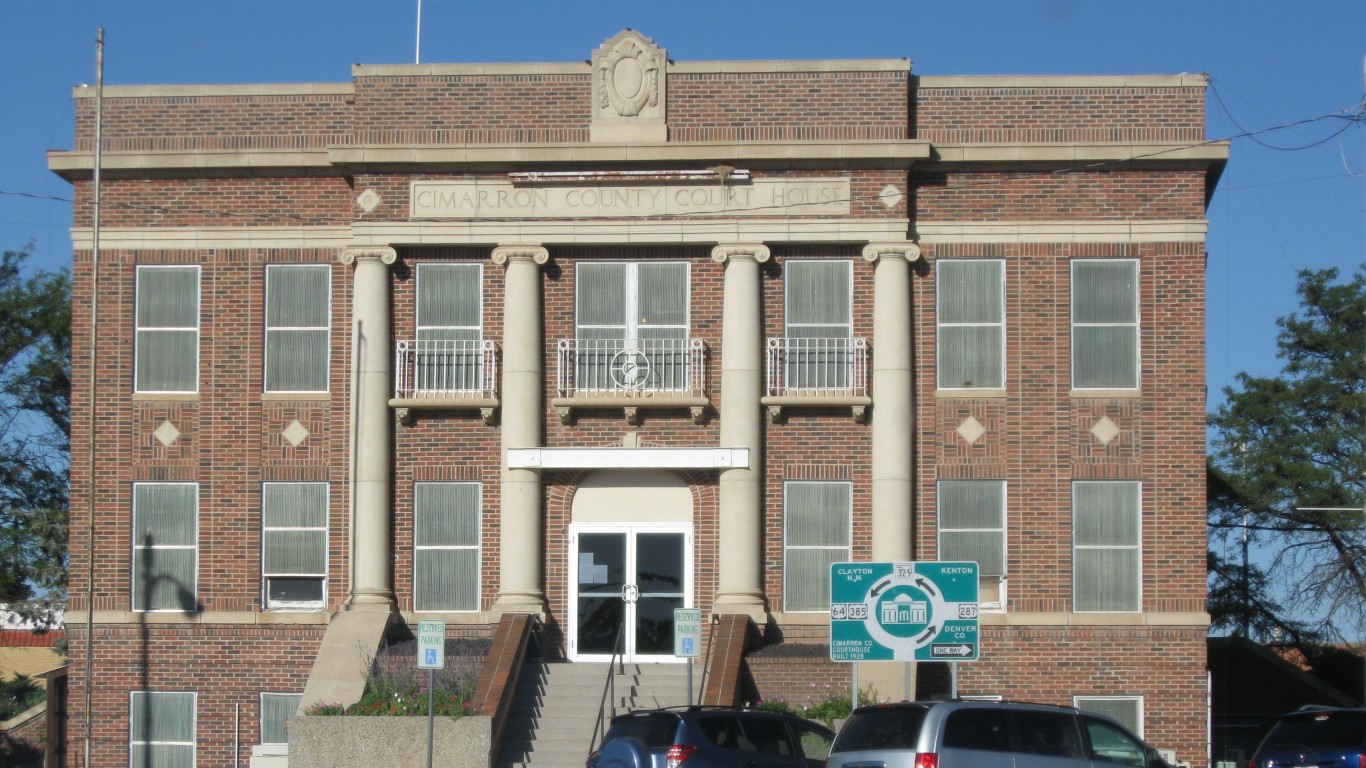
36. Oklahoma
> Reddest county: Cimarron County
Romney won 67% of Oklahoma’s votes in 2012 — only Wyoming and Utah cast a higher share of votes for the Republican presidential candidate. Romney received more than 90% of votes cast in Cimarron County. The county’s representation in Congress is similarly one-sided, as seats in both the senate and the state’s 3rd District — which includes Cimarron County — have been represented by Republicans for nearly 20 years.

37. Oregon
> Reddest county: Lake County
Despite the majority of state voters casting ballots for Obama, more than three-quarters of all Lake County voters cast a ballot for Romney in 2012. The county is part of the state’s 2nd District, which has been represented by Republican Rep. Greg Walden since 1999. Walden’s district has been in the news lately as it includes the Malheur National Wildlife Refuge, which is being occupied by armed protesters.
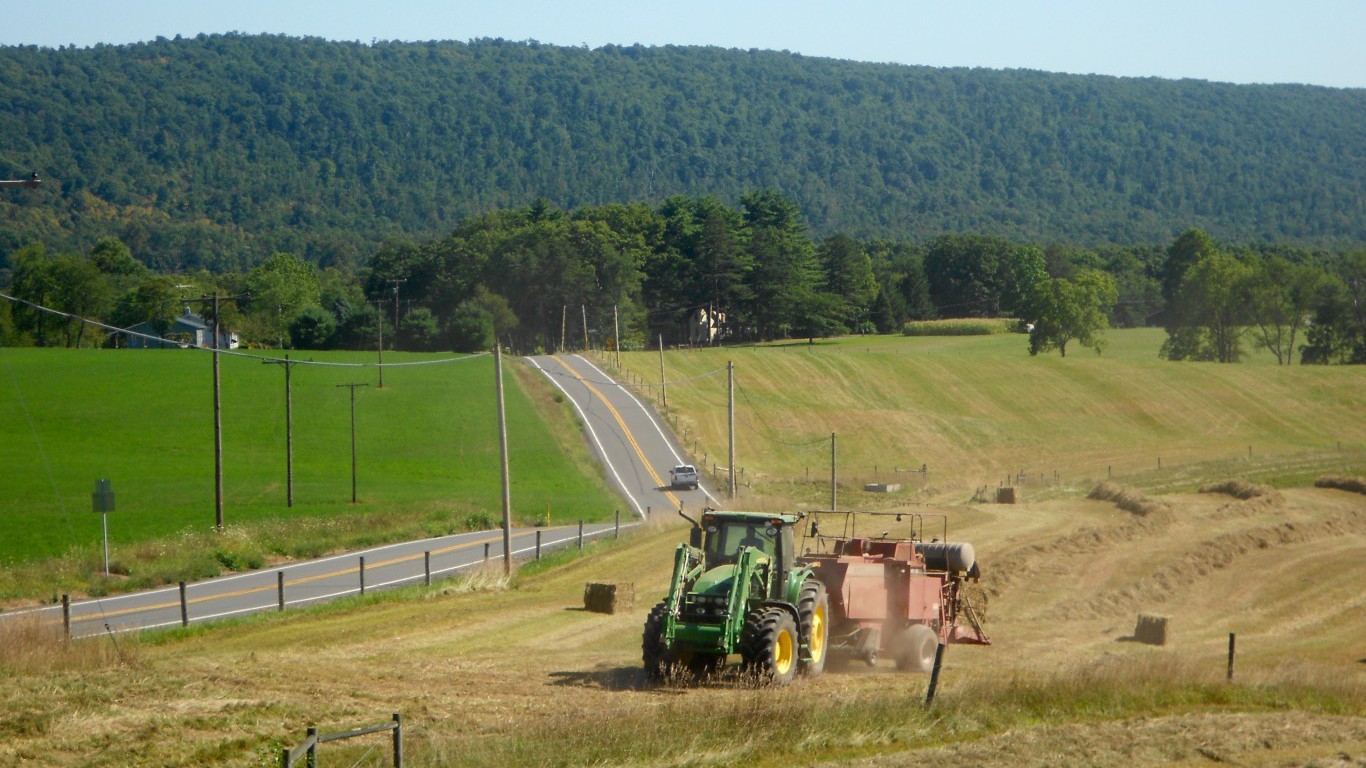
38. Pennsylvania
> Reddest county: Fulton County
With 47.0% votes going to Romney and 52.0% going to Obama, Pennsylvania had one of the closest presidential elections of any state in 2012. In Fulton County, however, the vote was less divisive. More than three-fourths of votes in the county went to Romney, the highest share in the state. In addition to voting for the Republican presidential candidate, the congressional district that covers the county has elected the same Republican to the House of Representatives for the past seven elections.
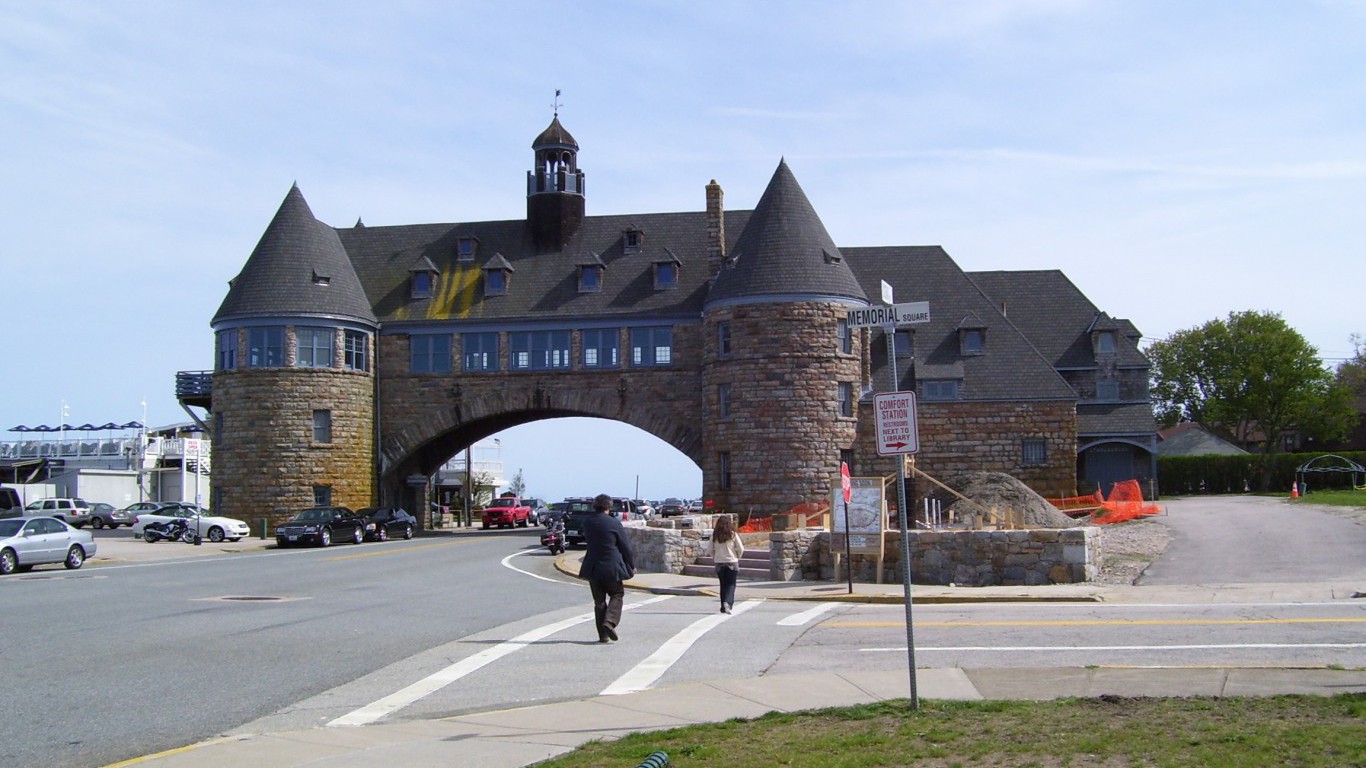
39. Rhode Island
> Reddest county: Washington County
With 63% of votes going to Obama in the 2012 election, Rhode Island is one of the bluest states in the country. Even in Washington County, the reddest county in the state, a majority of its votes still went to Obama. However, this share was low compared with other areas in the state. As in other Rhode Island counties, Washington voters also favor Democratic candidates in local elections. For the past seven elections, the congressional district that covers Washington County has elected Democrat Jim Langevin to the House of Representatives.
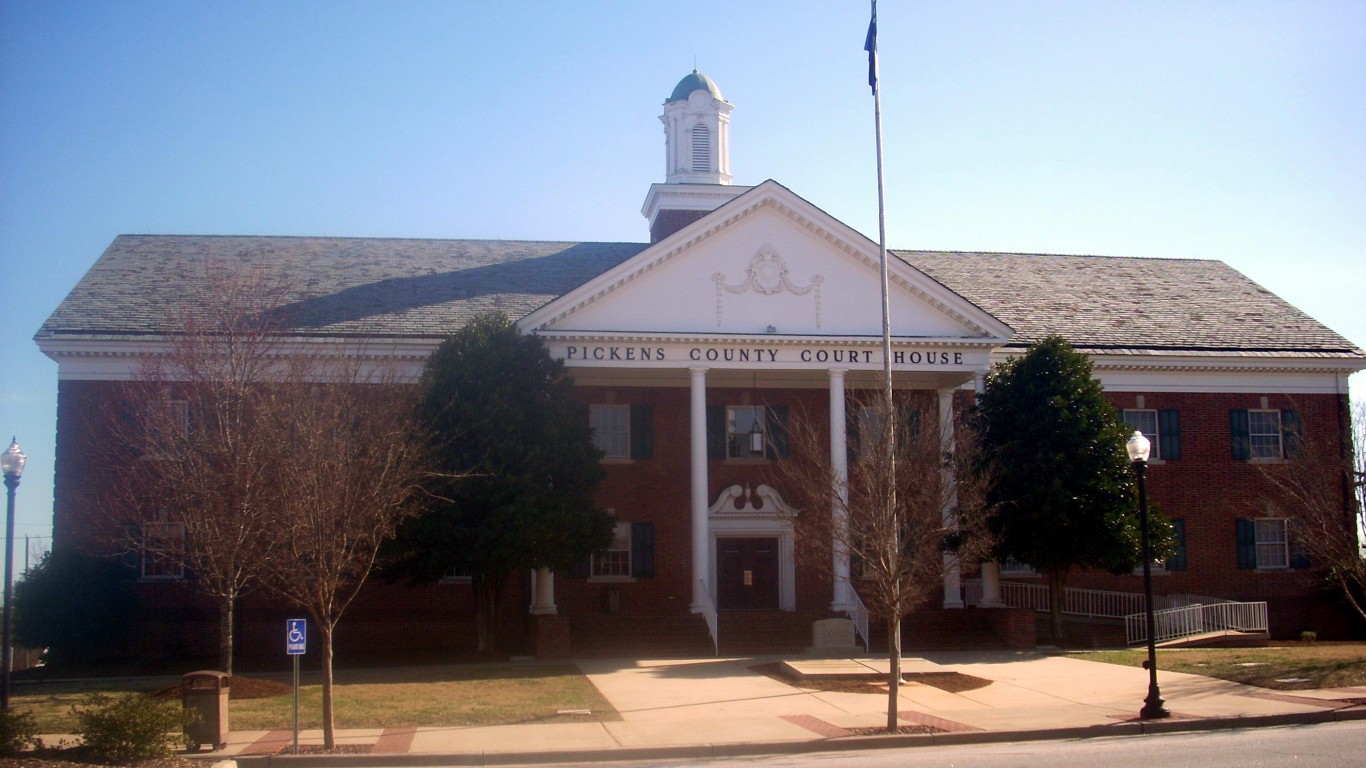
40. South Carolina
> Reddest county: Pickens County
Romney won 73.5% of the 2012 votes cast in Pickens County, the largest share of any county in South Carolina. In addition to preferring the Republican presidential candidate, the county sent a Republican to the U.S. House of Representatives in each of the last five congressional elections. As is the case in many of the most conservative counties, the racial composition in Pickens is not especially diverse. Roughly 87% of Pickens County residents identify as white, considerably higher than the nationwide composition.
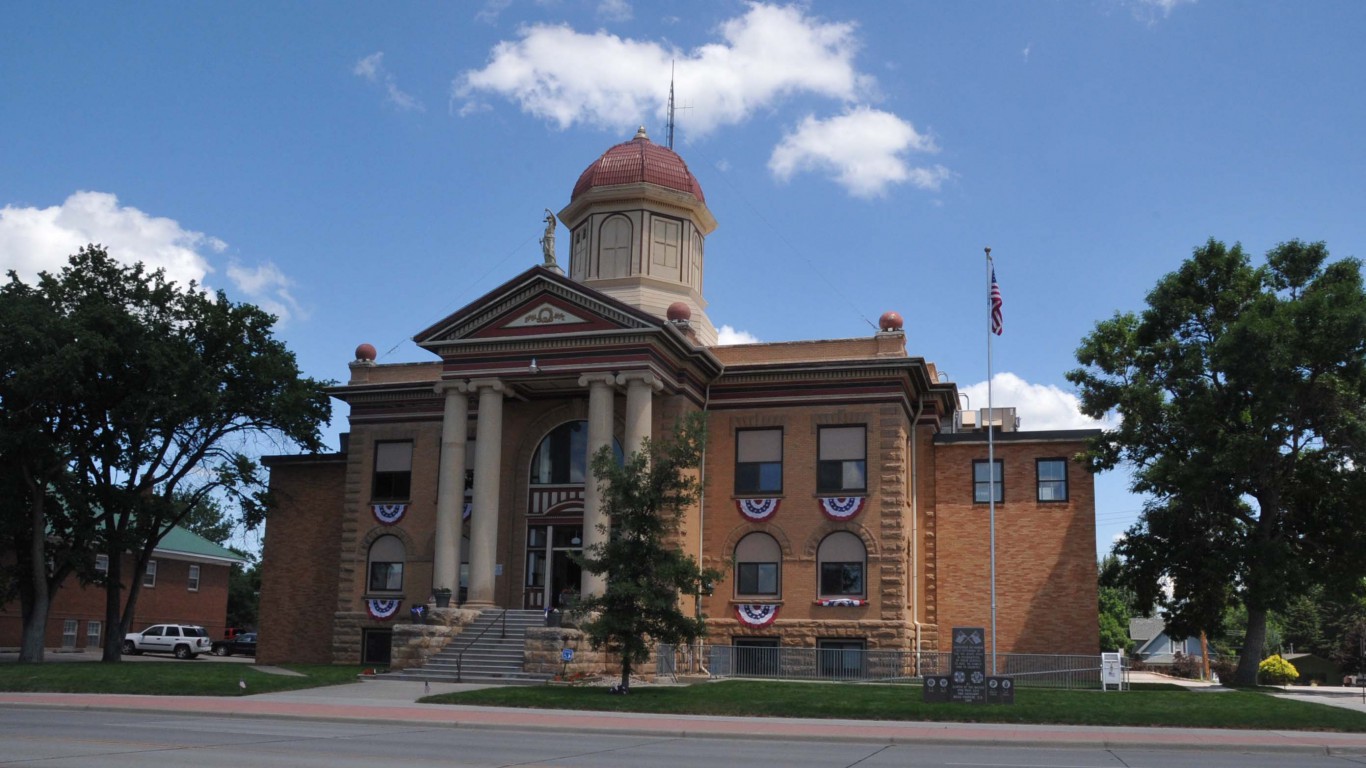
41. South Dakota
> Reddest county: Butte County
Nearly three-quarters of Butte County residents cast their vote for Romney in the 2012 election, the most of any South Dakota county. Despite strong support for the Republican presidential candidate, the county does not always support the Republican candidate on the congressional level. In two of the last five elections, county voters sent a Democratic representative to Washington.
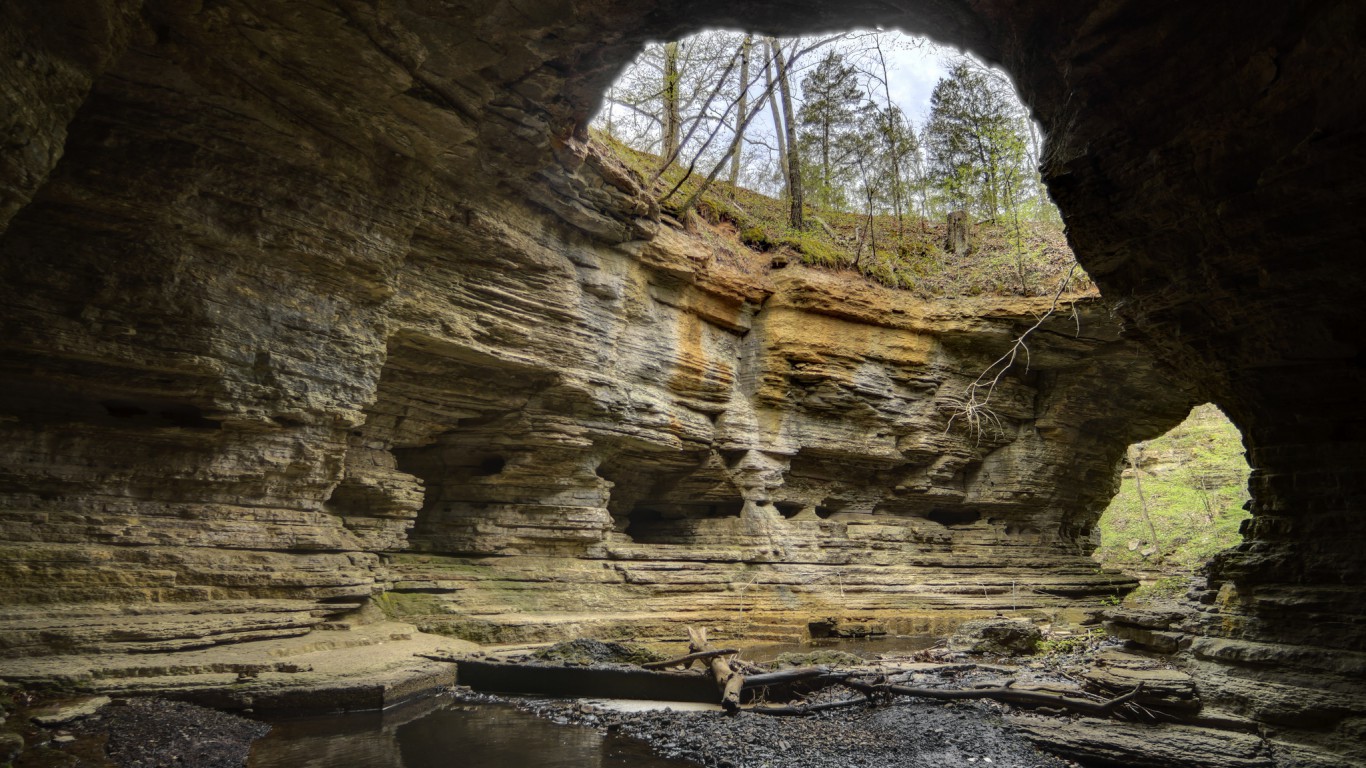
42. Tennessee
> Reddest county: Wayne County
In 2012, Romney won 77.5% of the 2012 votes cast in Wayne County, a larger share than in any other county in Tennessee. Republican voters on the whole tend to be less educated than voters support Democrats, and education levels in Wayne are particularly low. Only 8.2% of adults have at least a bachelor’s degree, considerably lower than the 29.3% of American adults with such a degree.
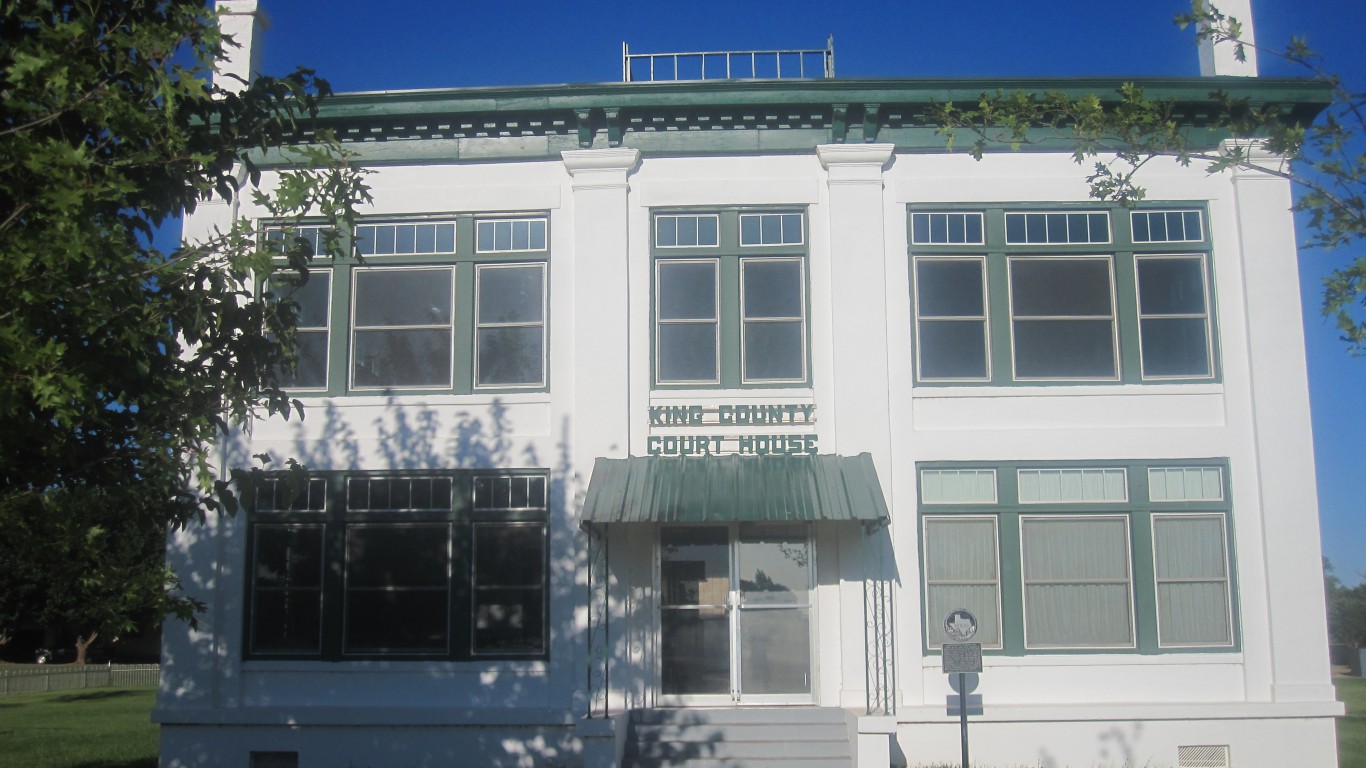
43. Texas
> Reddest county: King County
Ted Cruz, one of Texas’s two Republican Senators, is currently vying for the Republican presidential nomination. A traditionally conservative state, all 38 of Texas’s electoral votes went to Romney in 2012. Still, no county in the Lone Star State is more conservative than King County, where only five of the 145 people who voted chose Obama in 2012. King County voters also appear satisfied with their Republican representative. Rep. Mac Thornberry has been elected to the U.S. House of Representative in each of the past five congressional elections.
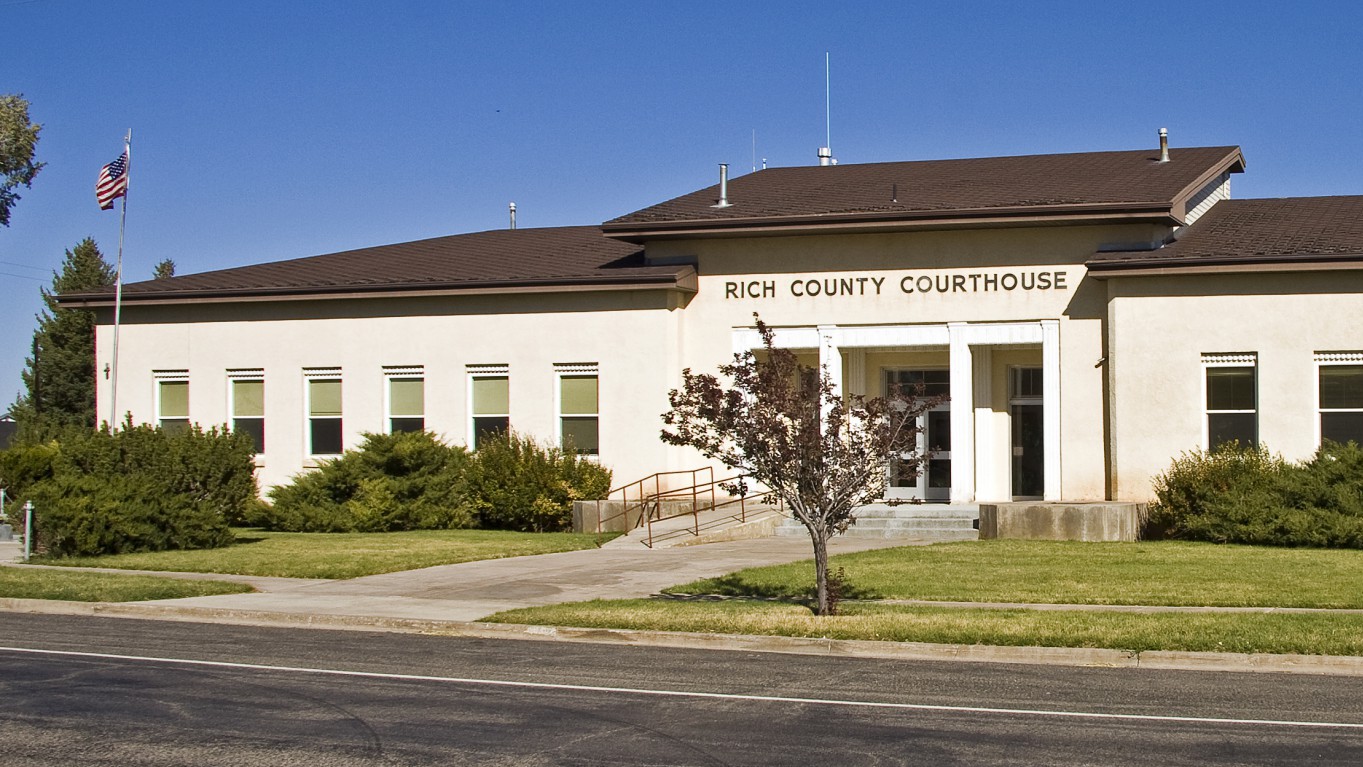
44. Utah
> Reddest county: Rich County
Both of Utah’s senators are Republican and all six of the state’s electoral votes went to Romney in 2012. In Rich County Romney was even more successful, winning 90.8% of the votes, a higher share than in all other counties in the state and one of the largest share in the nation. In each of the last five congressional elections, Rich County voters have sent Republican Rep. Rob Bishop to Washington.
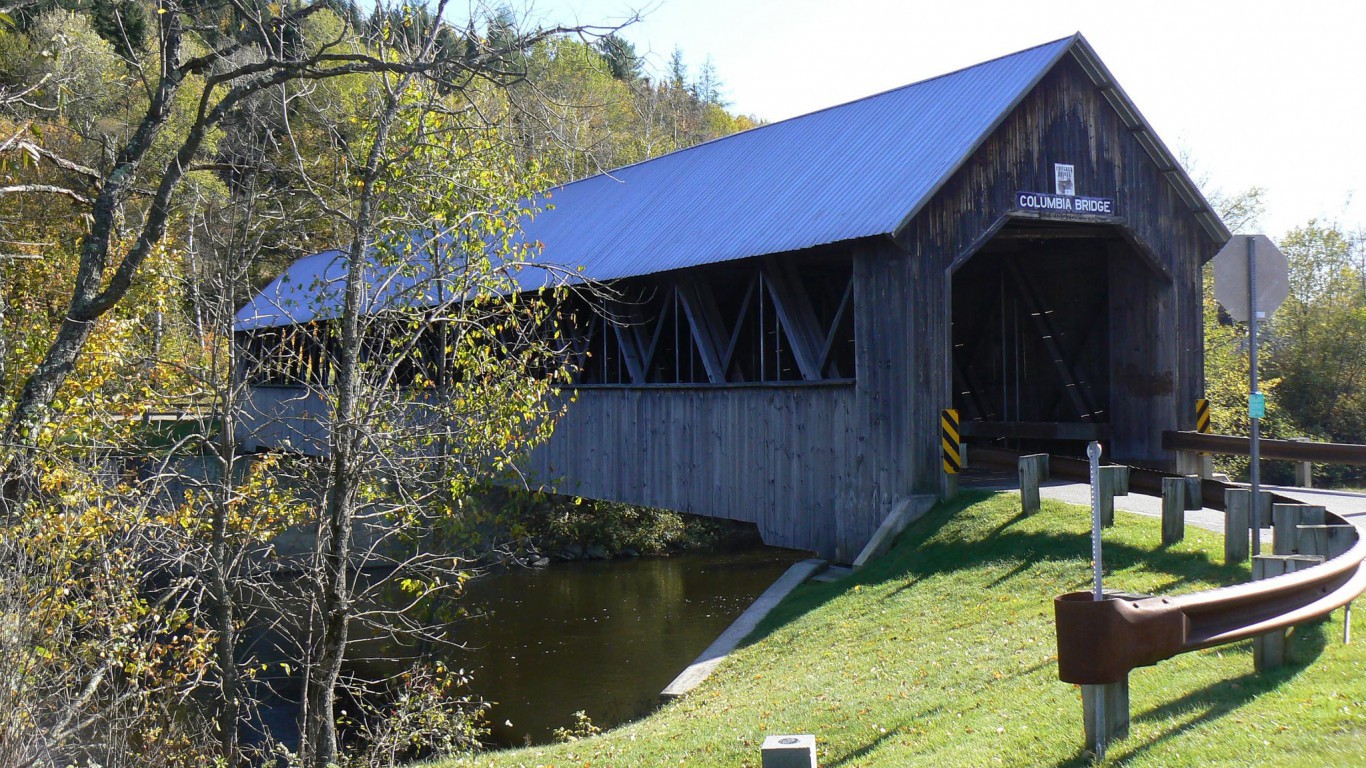
45. Vermont
> Reddest county: Essex County
With 67.0% of votes going to Obama, only Hawaii had a higher share of Democratic votes than Vermont in the 2012 election. While Essex County is the reddest in the state, a majority of its votes still went to Obama. Democrats frequently garner support from highly educated voters, and the relatively small share of college-educated adults in Essex County could be tied to its rightward lean. Just 14.1% of county adults have at least a bachelor’s degree, less than half the 29.3% of Americans who do nationwide.
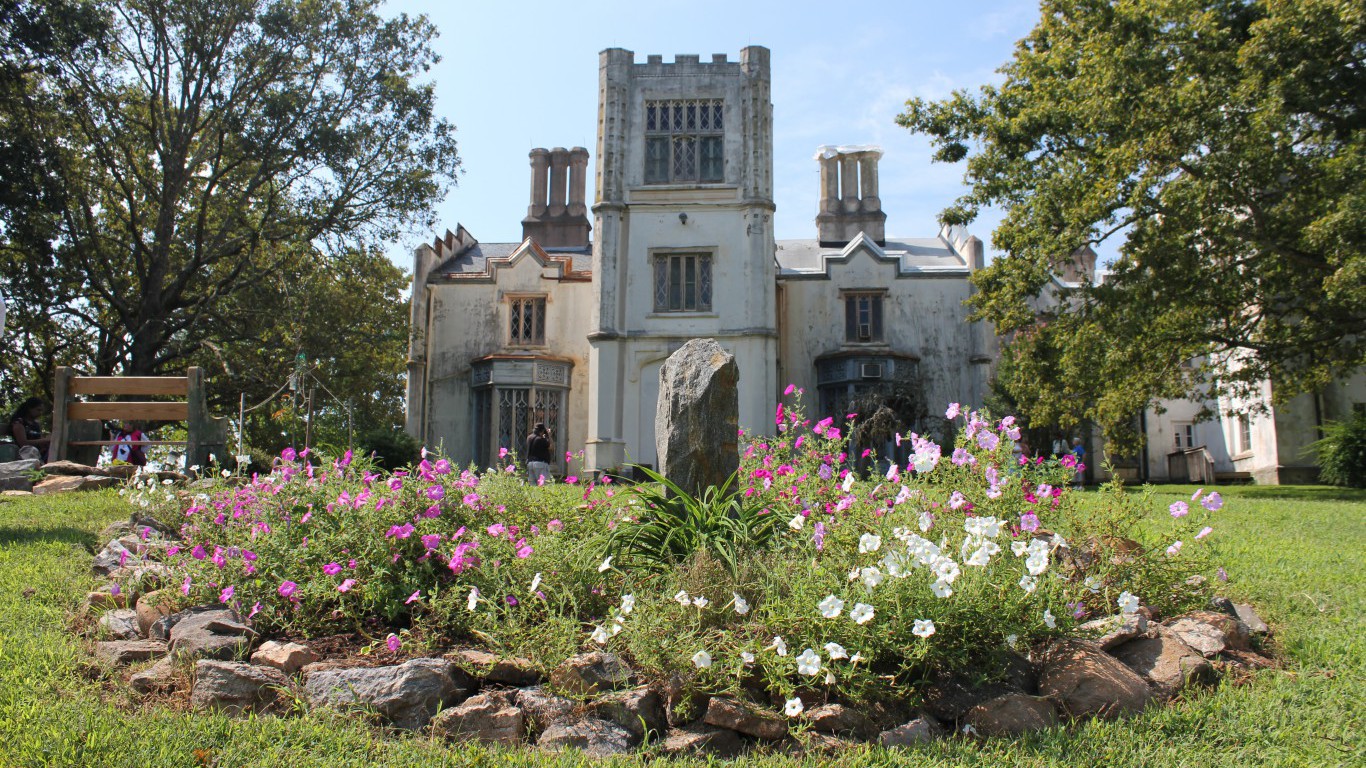
46. Virginia
> Reddest county: Powhatan County
Both senators from Virginia are Democrats and all 13 of Virginia’s electoral votes went to Obama in 2012. However, in Powhatan, Virginia’s reddest county, 72.4% of voters preferred Romney to Obama. Additionally, in each of the last five congressional elections, Powhatan County voters sent Rep. Randy Forbes, a Republican, to Washington. Like many conservative counties, a relatively large share of Powhatan residents — 83% — identify solely as white.
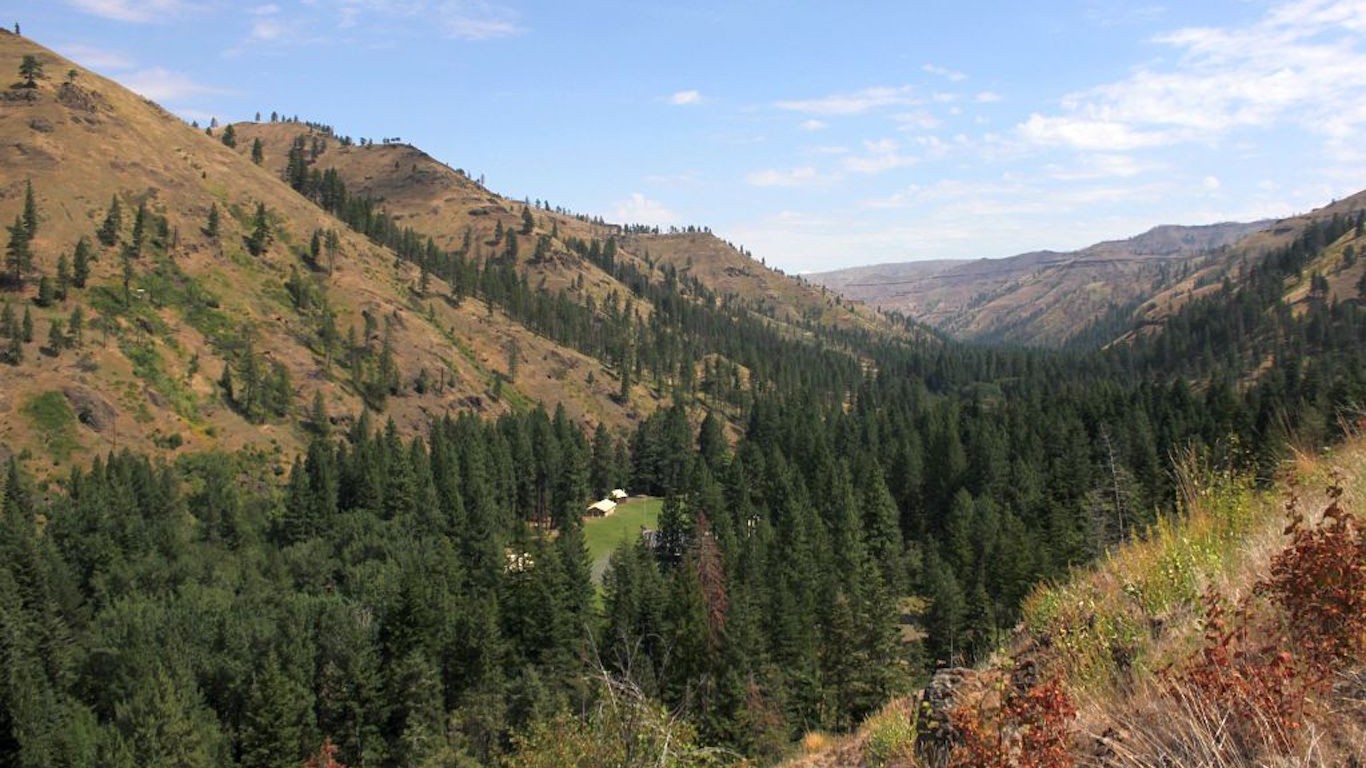
47. Washington
> Reddest county: Garfield County
Of the 1,275 votes cast in Garfield County in 2012, 912, or 71.5%, went to Romney. Though the number of votes was relatively small, the share of votes cast for Romney was larger share than in any other county in the state. In addition, in each of the last five congressional elections, the county sent a Republican to the U.S. House of Representatives.
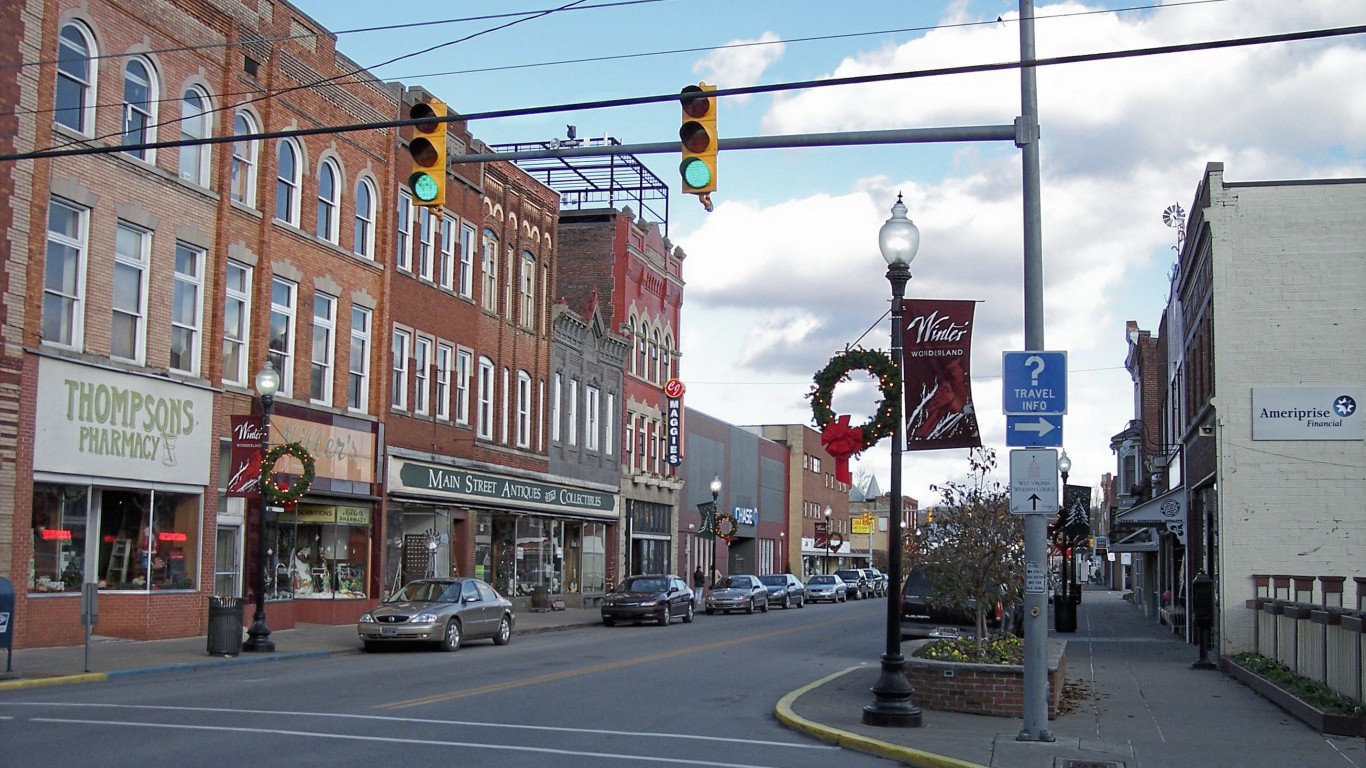
48. West Virginia
> Reddest county: Upshur County
All five of West Virginia’s electoral votes went to Romney in 2012. Only about a quarter of voters in Upshur County cast their ballot for Obama, while Romney won 71.7% of the 2012 votes cast in West Virginia’s reddest county. Like many other conservative counties, Upshur is predominantly white. Nearly 97% of the county’s population identifies solely as white. In each of the last five congressional elections, county voters have sent a Republican representative to Washington.
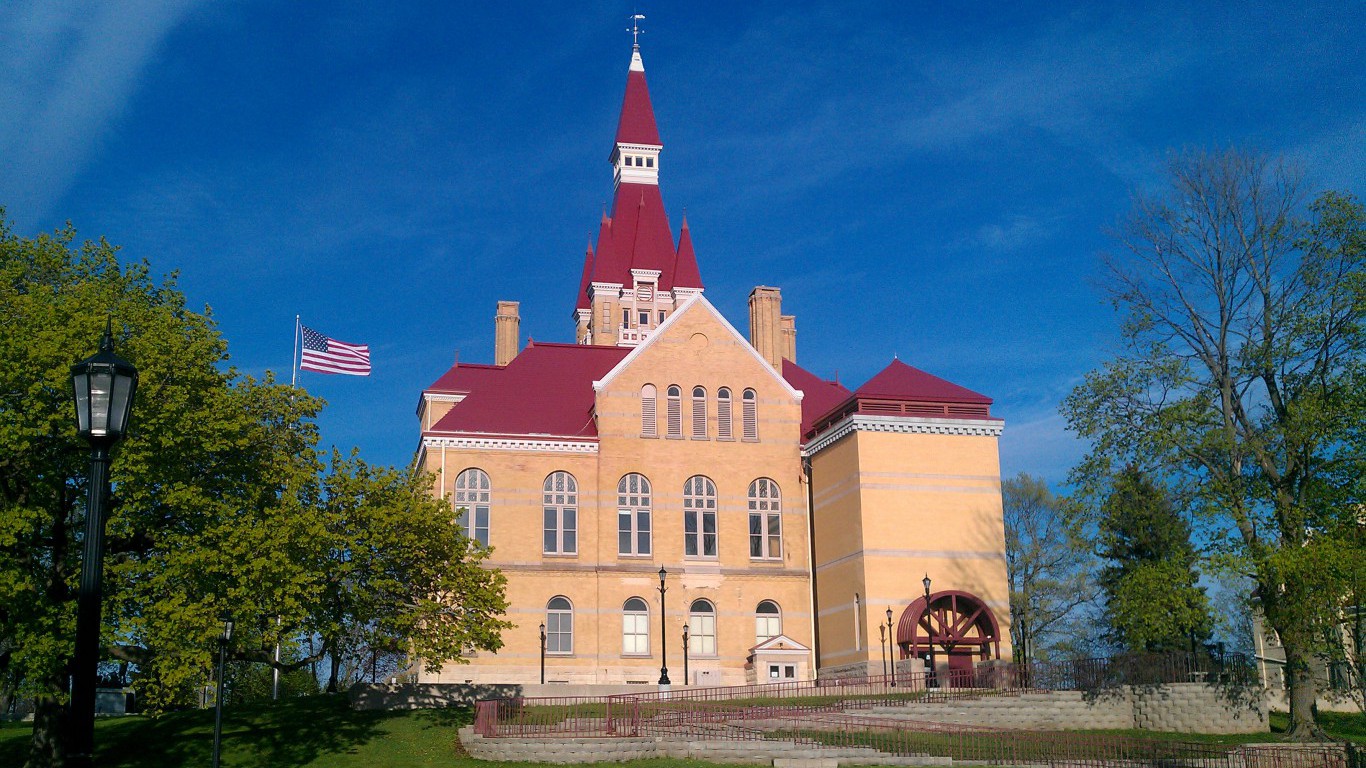
49. Wisconsin
> Reddest county: Washington County
Though Obama won Wisconsin, Romney won 69.6% of the 2012 votes cast in Washington County, a larger share than in all other counties in the state. As in many Republican-leaning counties, Washington County voters are less racially diverse and much less likely to be poor than the typical American. Only 6.2% of county residents live in poverty, less than half the national poverty rate of 15.6%. Additionally, approximately 94% of residents identify solely as white.
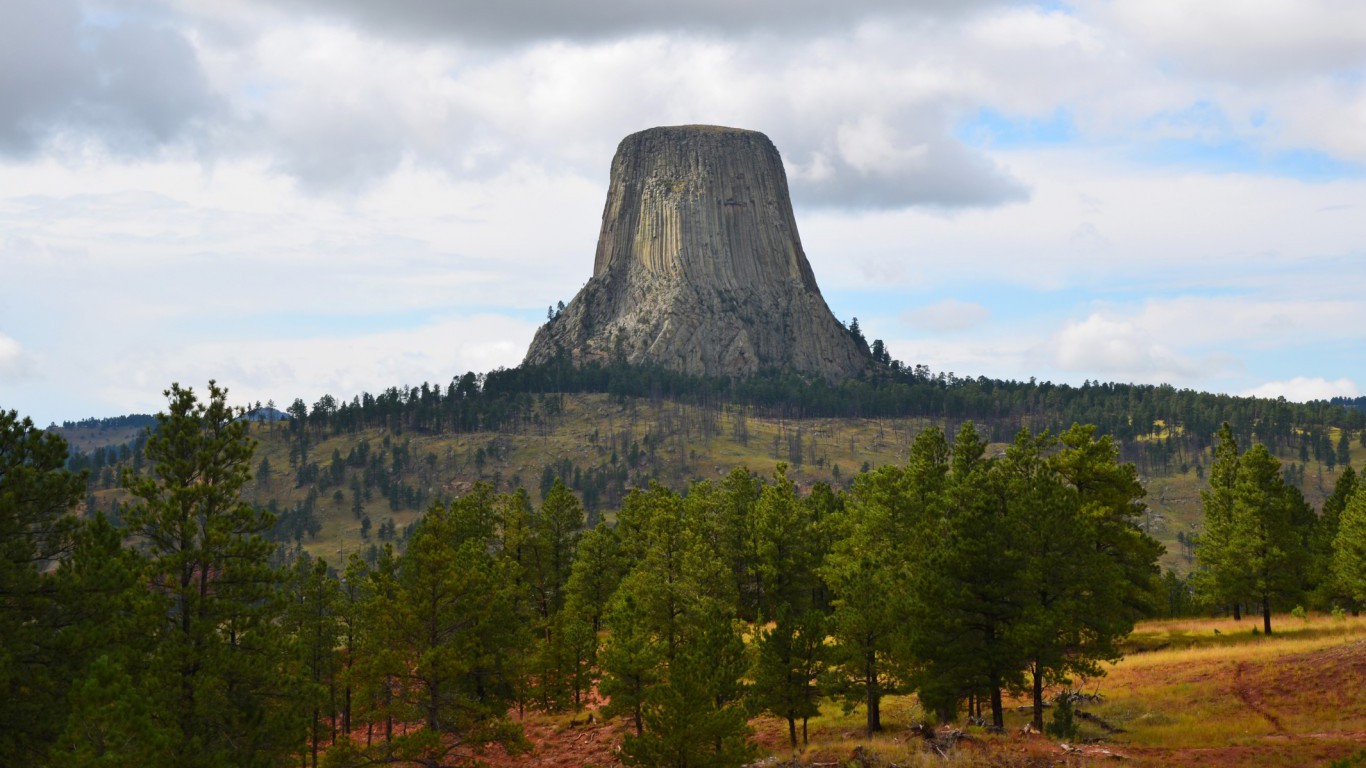
50. Wyoming
> Reddest county: Crook County
Crook is the reddest county in an especially red state. Romney won 85% of the 2012 votes cast in the county. Additionally, county voters have sent a Republican representative to Washington in each of the last five congressional elections. Wyoming’s two state senators, John Barrasso and Mike Enzi, are also Republicans.
Methodology
To identify the most Republican county in each state, 24/7 Wall St. created an index from various political characteristics of U.S. counties. The index is composed of three subindices: county representation in the U.S. House of Representatives in the last five congressional cycles, state representation in the U.S. Senate in the last five congressional cycles, and the share of votes cast in the 2012 presidential election. Each subindex ranges from -1 to 1, with extreme values given to counties where representation or voting shares were dominated by a single party, either Republican or Democrat. The reddest county in each state is the highest sum of our three indices. Our analysis included only counties that cast more than 2,000 total votes. The percentage of county residents who had attained at least a bachelor’s degree, median household income, poverty rates, and the share of residents identifying as white come from the U.S. Census bureau’s 204 American Community Survey five-year estimates.
Are You Ahead, or Behind on Retirement? (sponsor)
If you’re one of the over 4 Million Americans set to retire this year, you may want to pay attention. Many people have worked their whole lives preparing to retire without ever knowing the answer to the most important question: are you ahead, or behind on your retirement goals?
Don’t make the same mistake. It’s an easy question to answer. A quick conversation with a financial advisor can help you unpack your savings, spending, and goals for your money. With SmartAsset’s free tool, you can connect with vetted financial advisors in minutes.
Why wait? Click here to get started today!
Thank you for reading! Have some feedback for us?
Contact the 24/7 Wall St. editorial team.